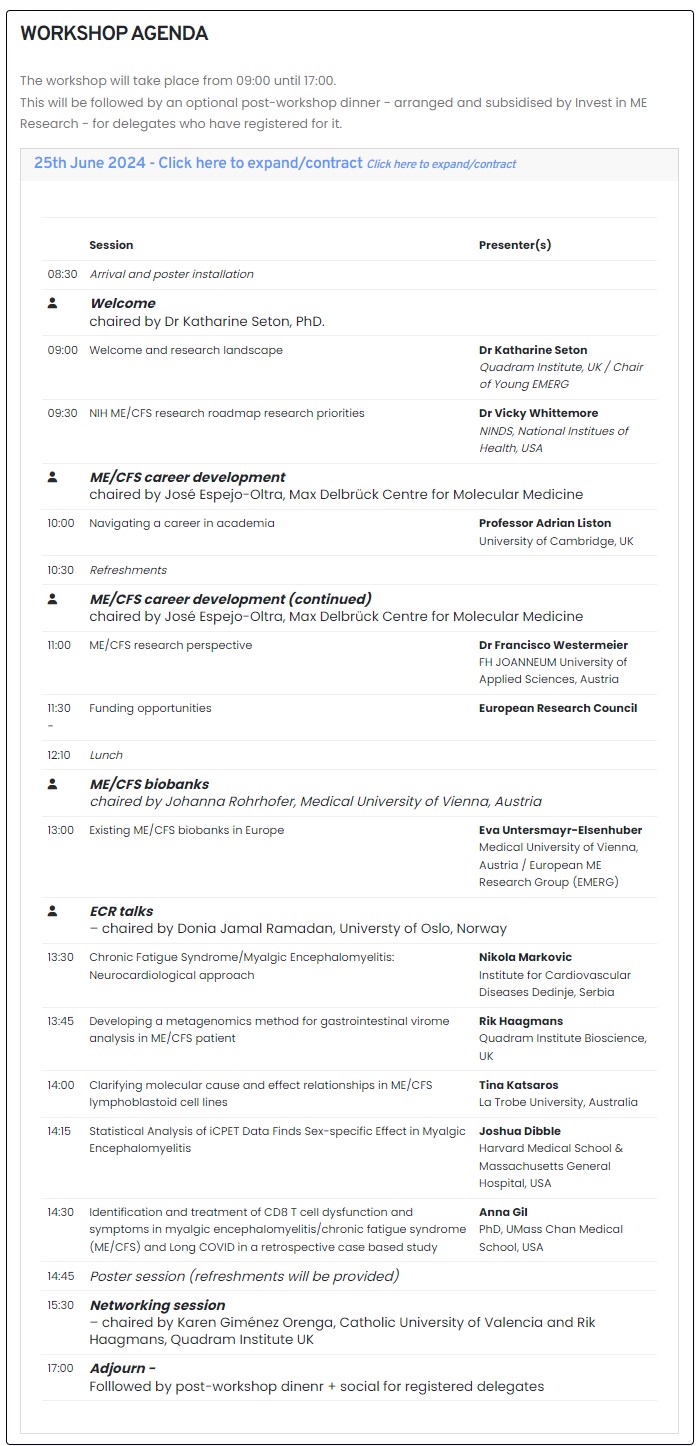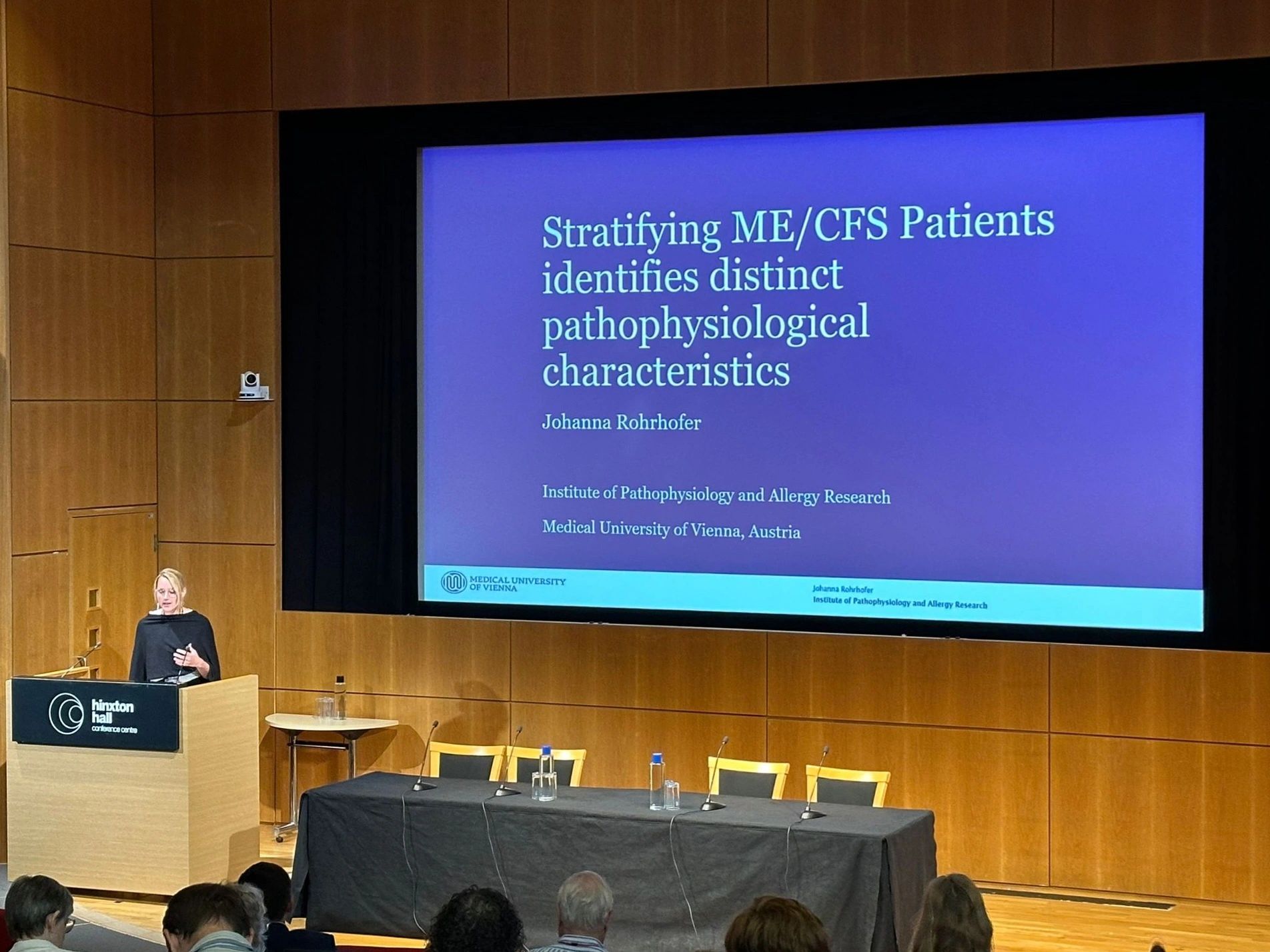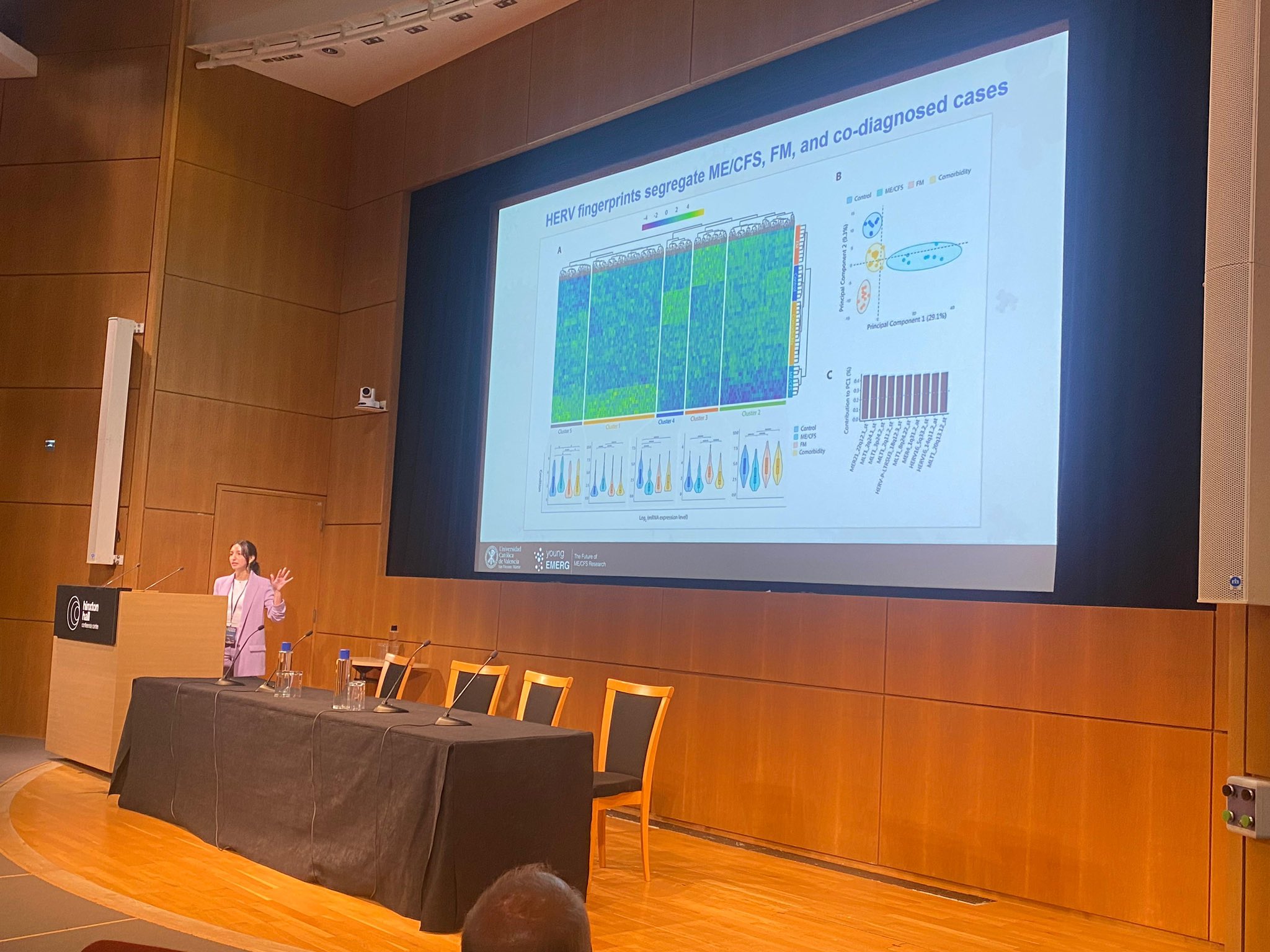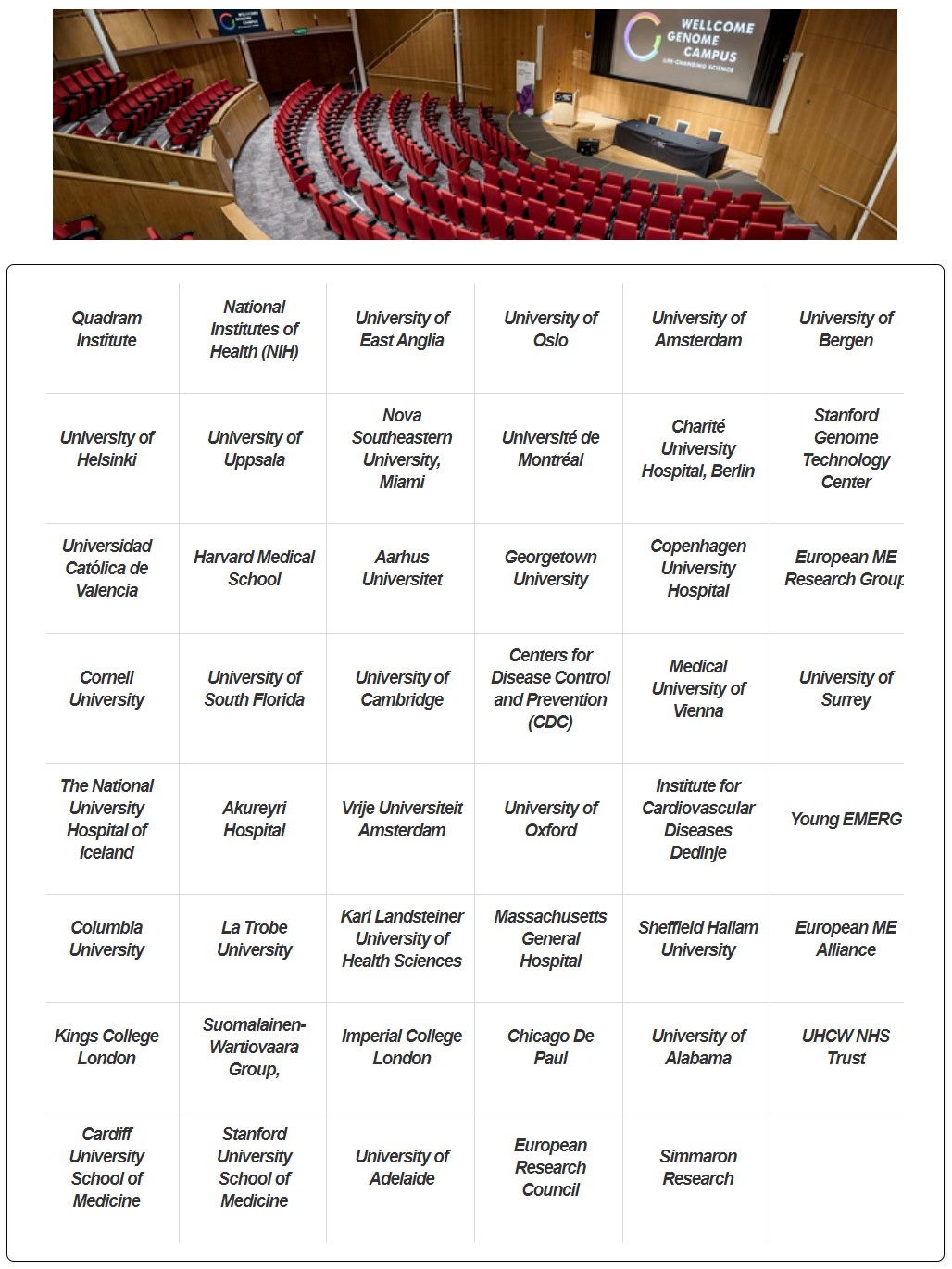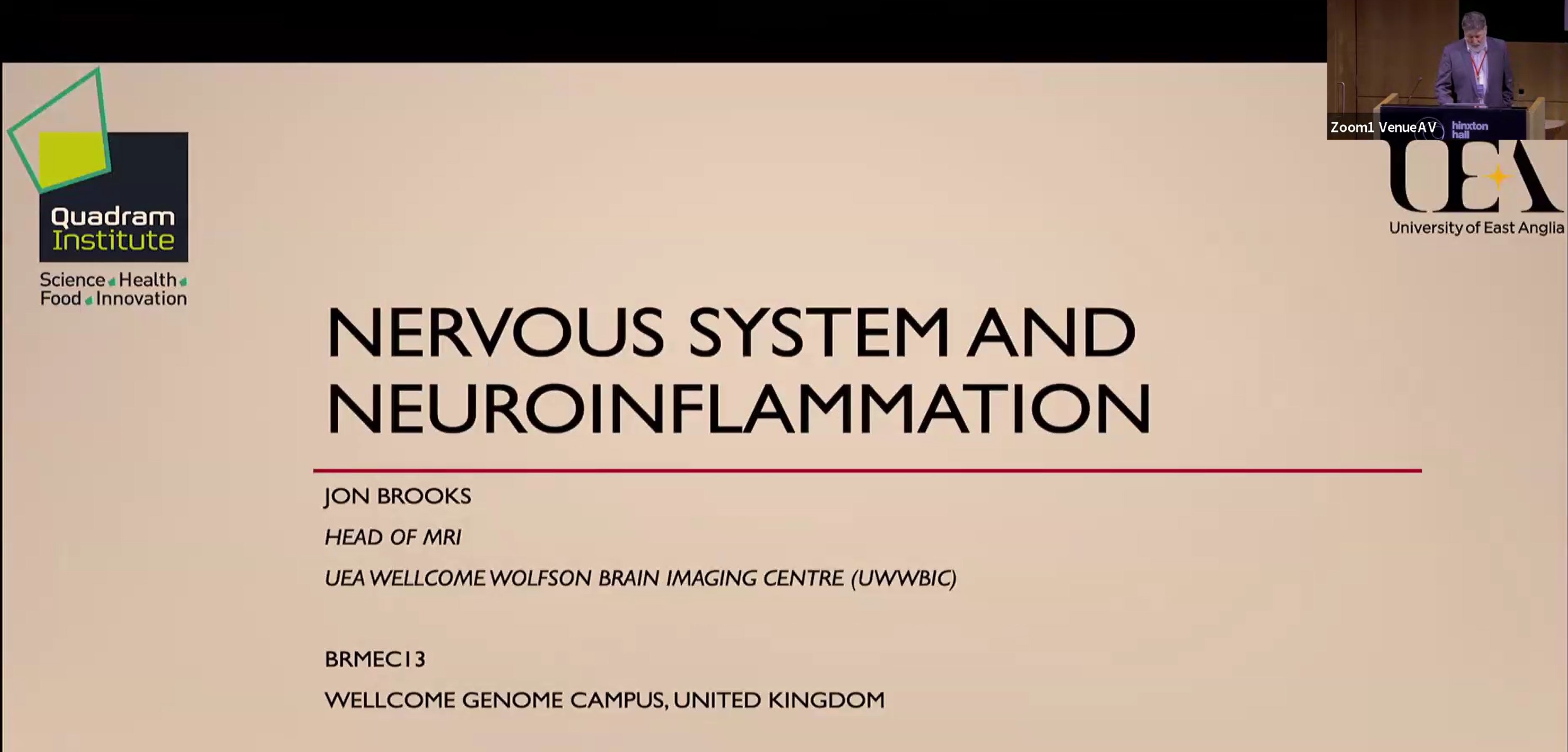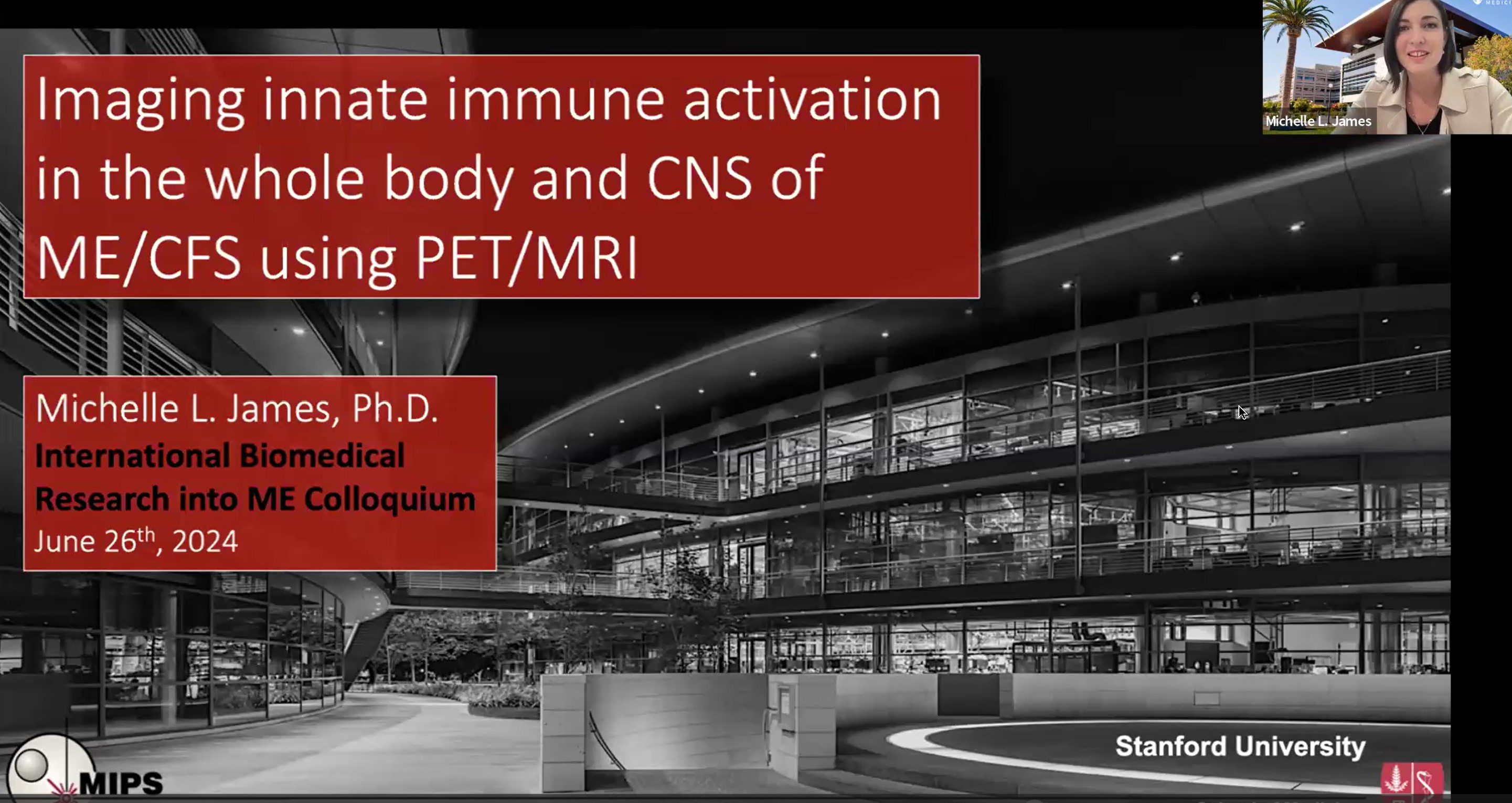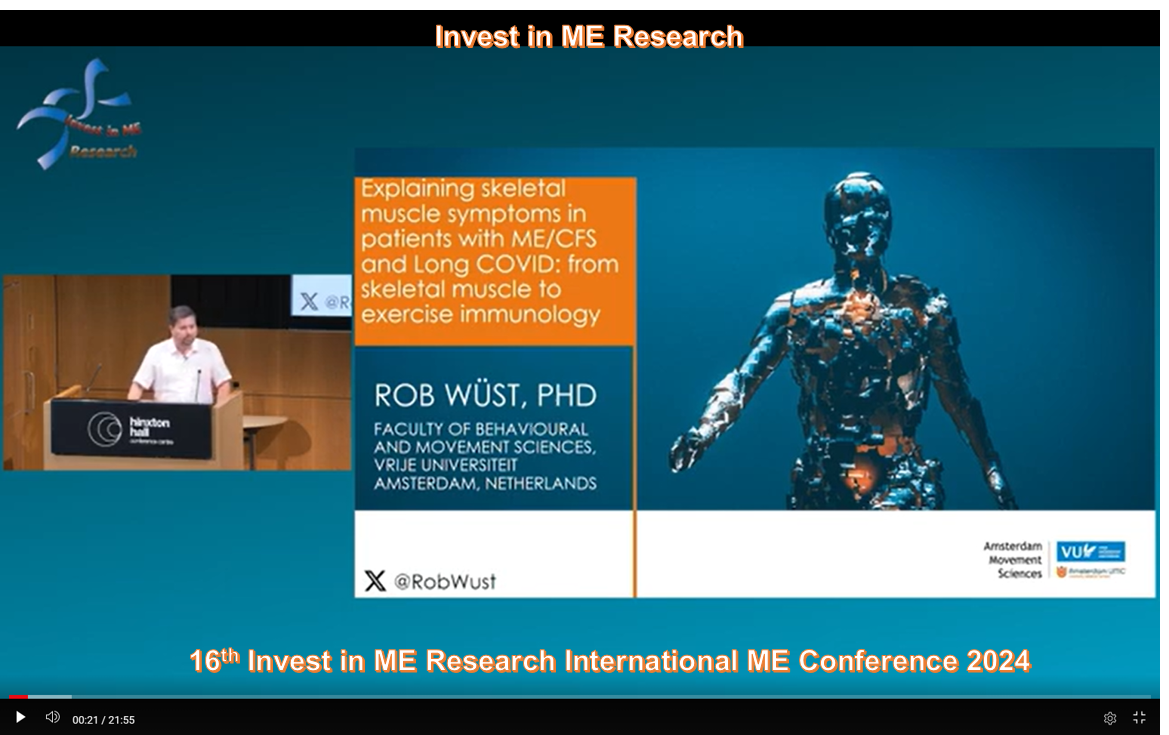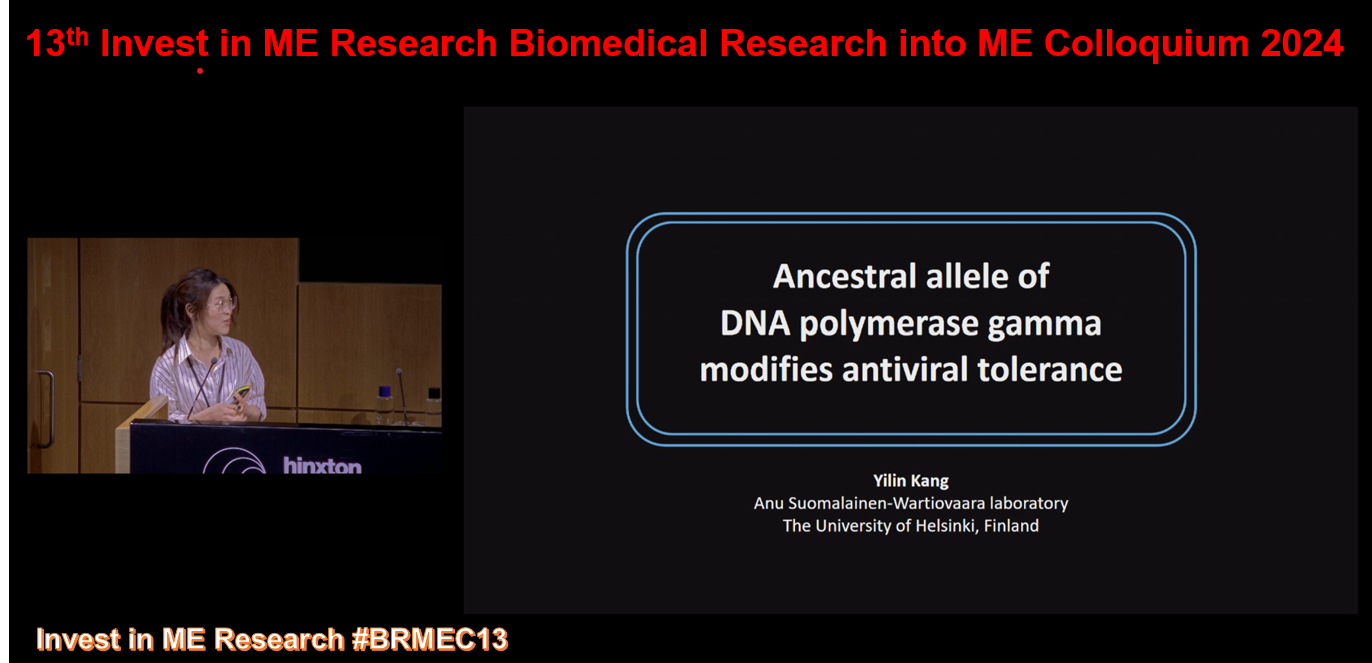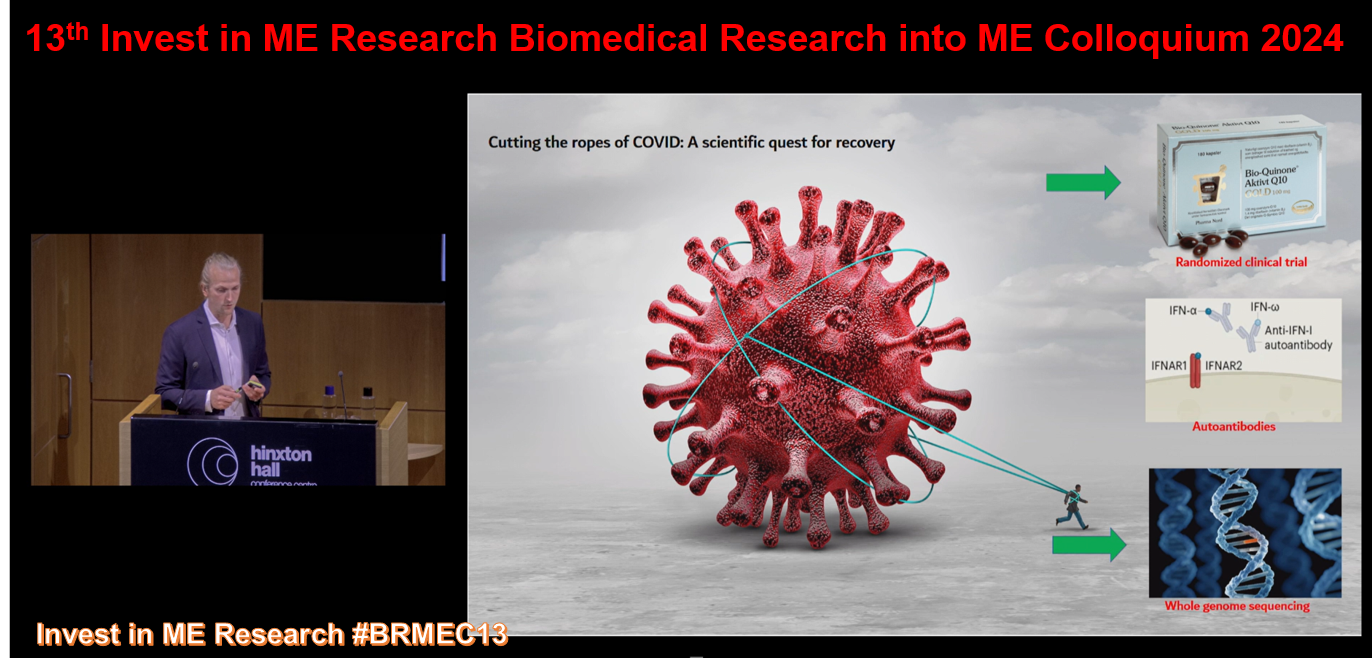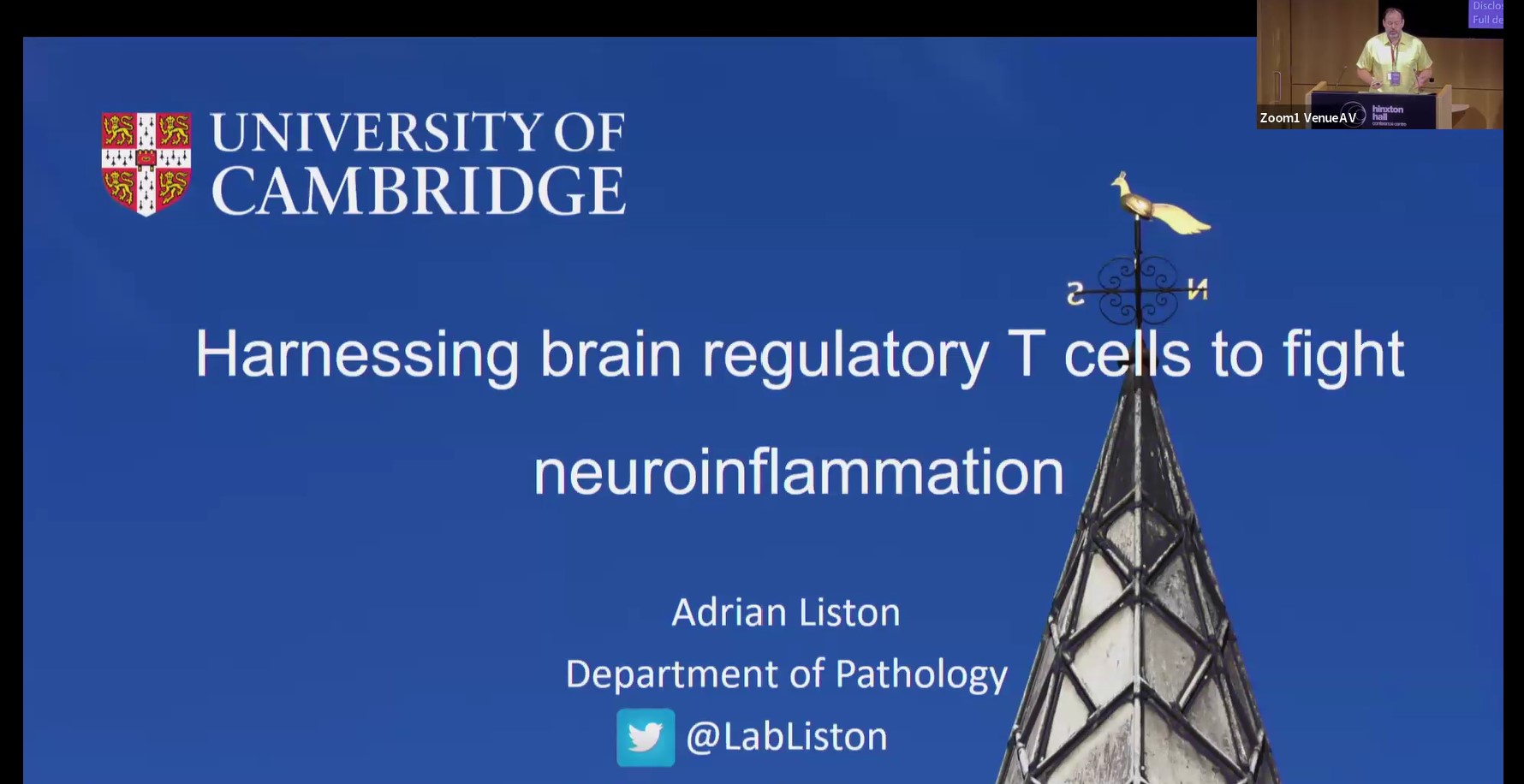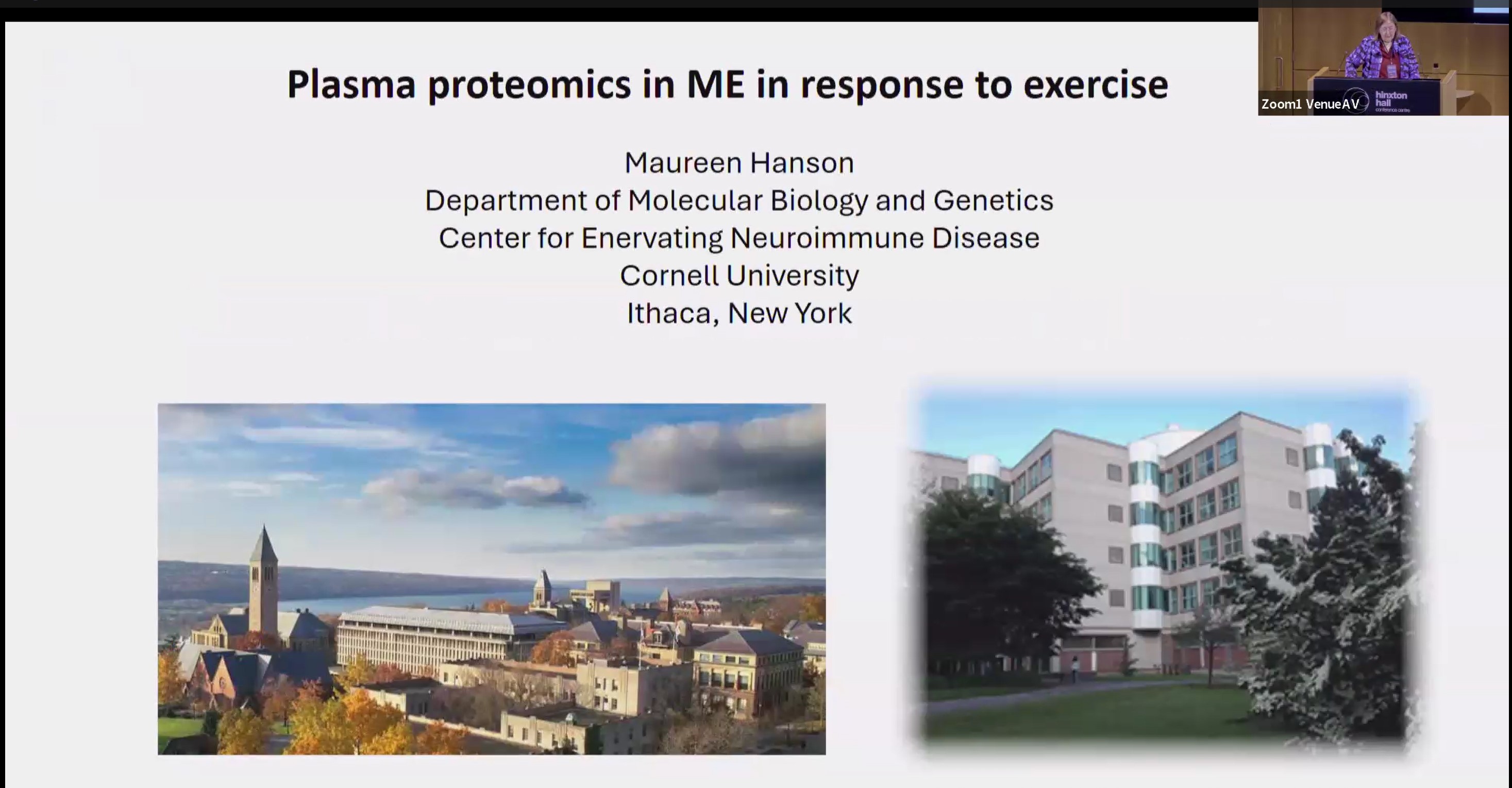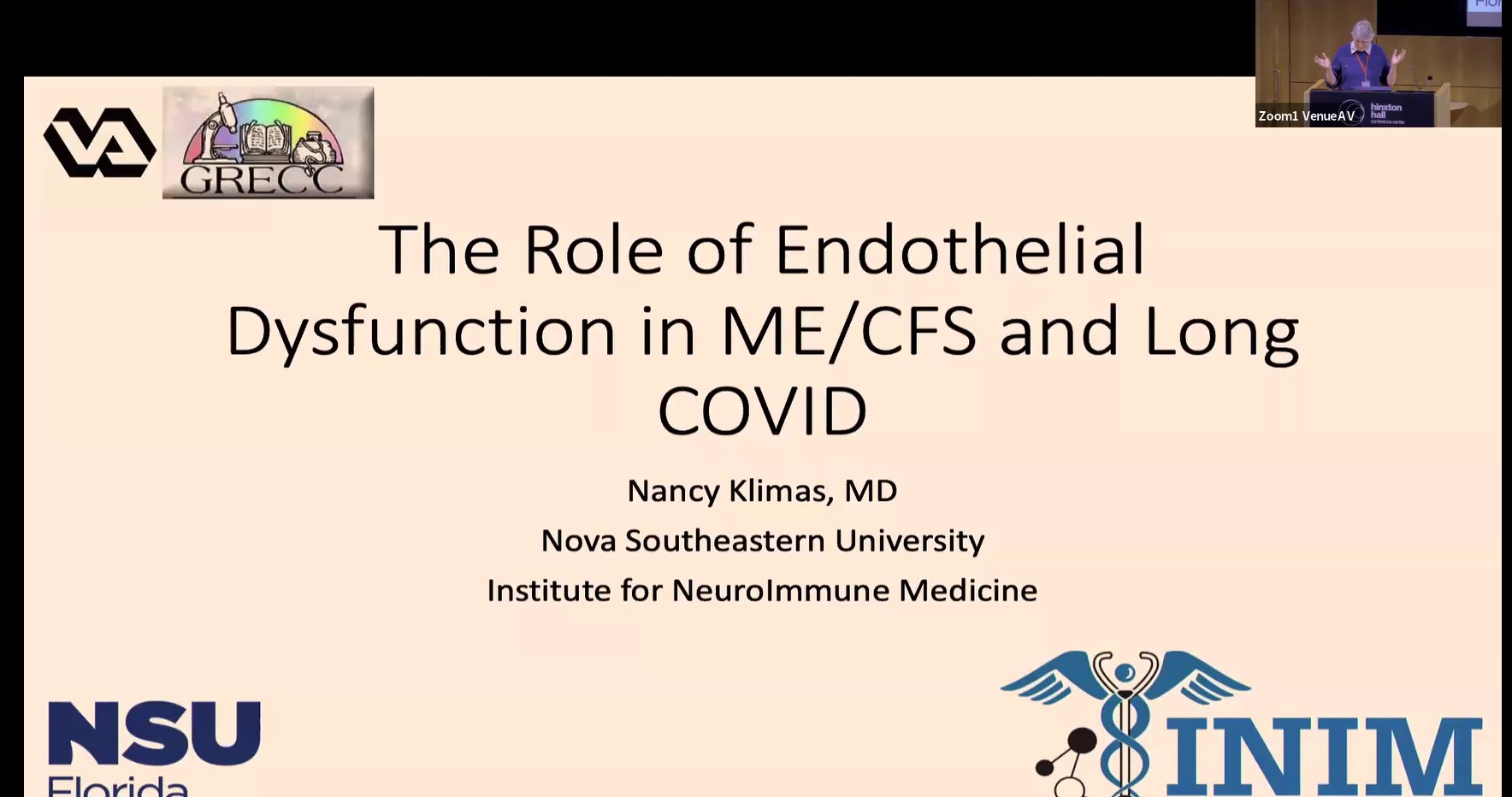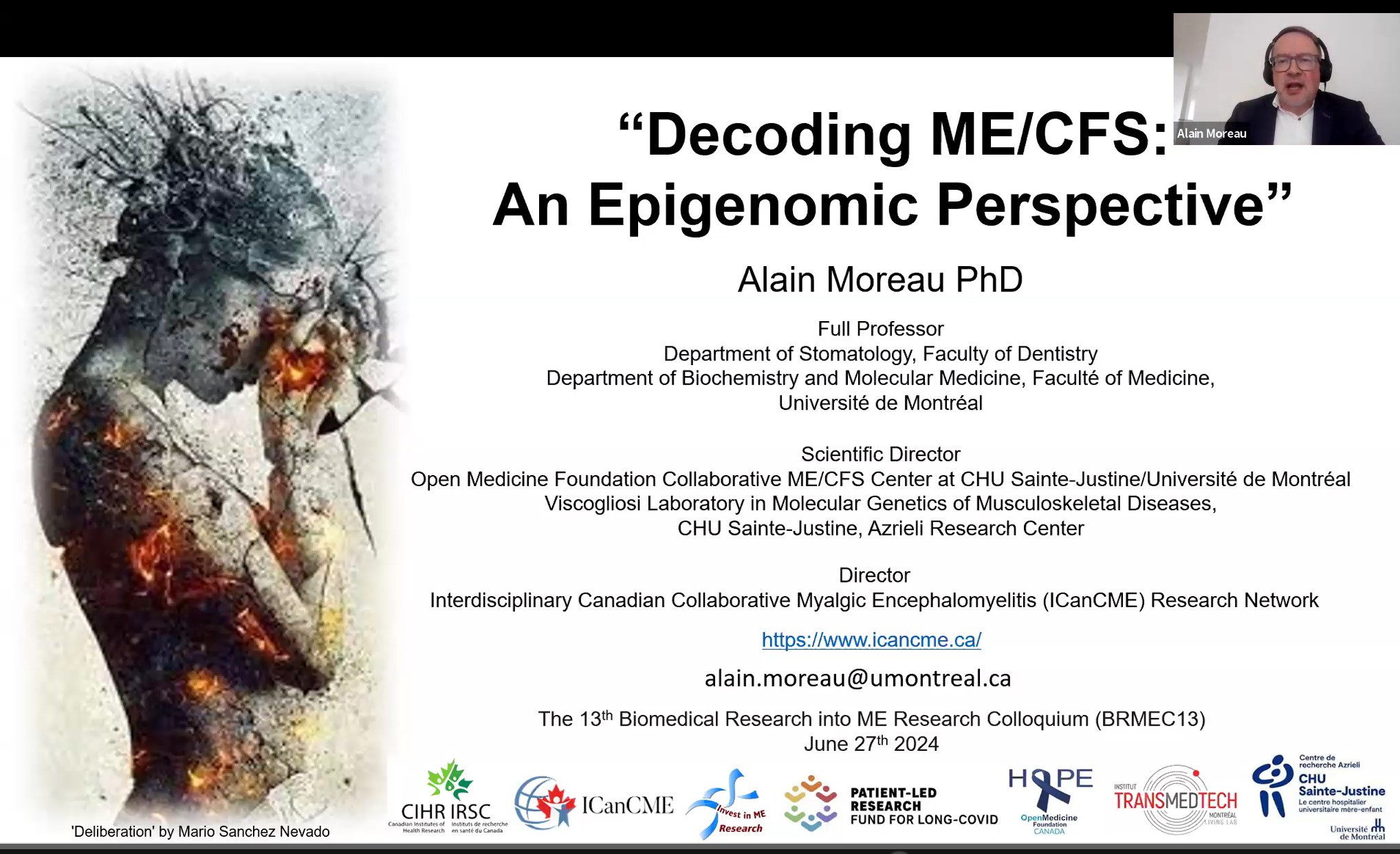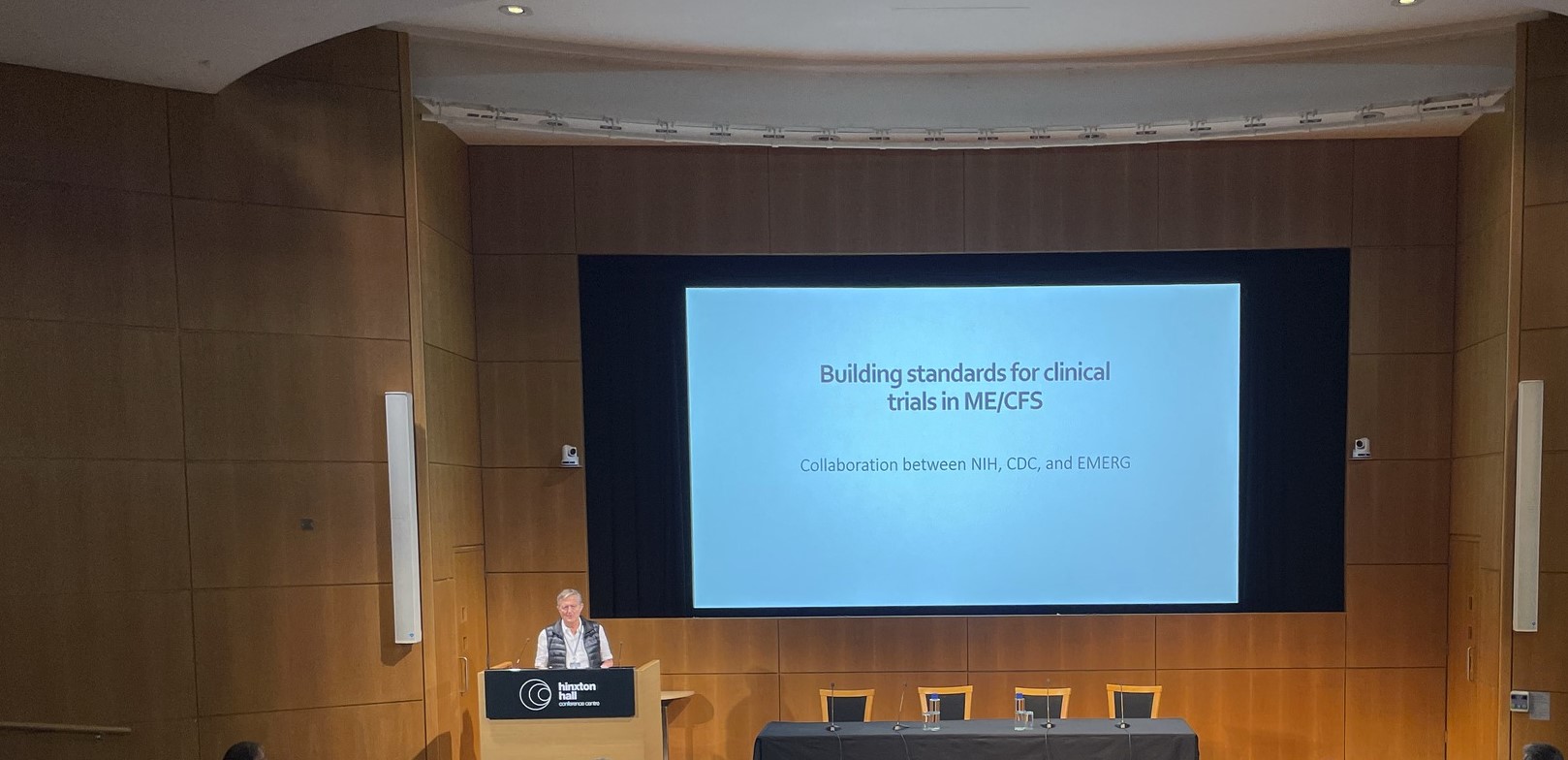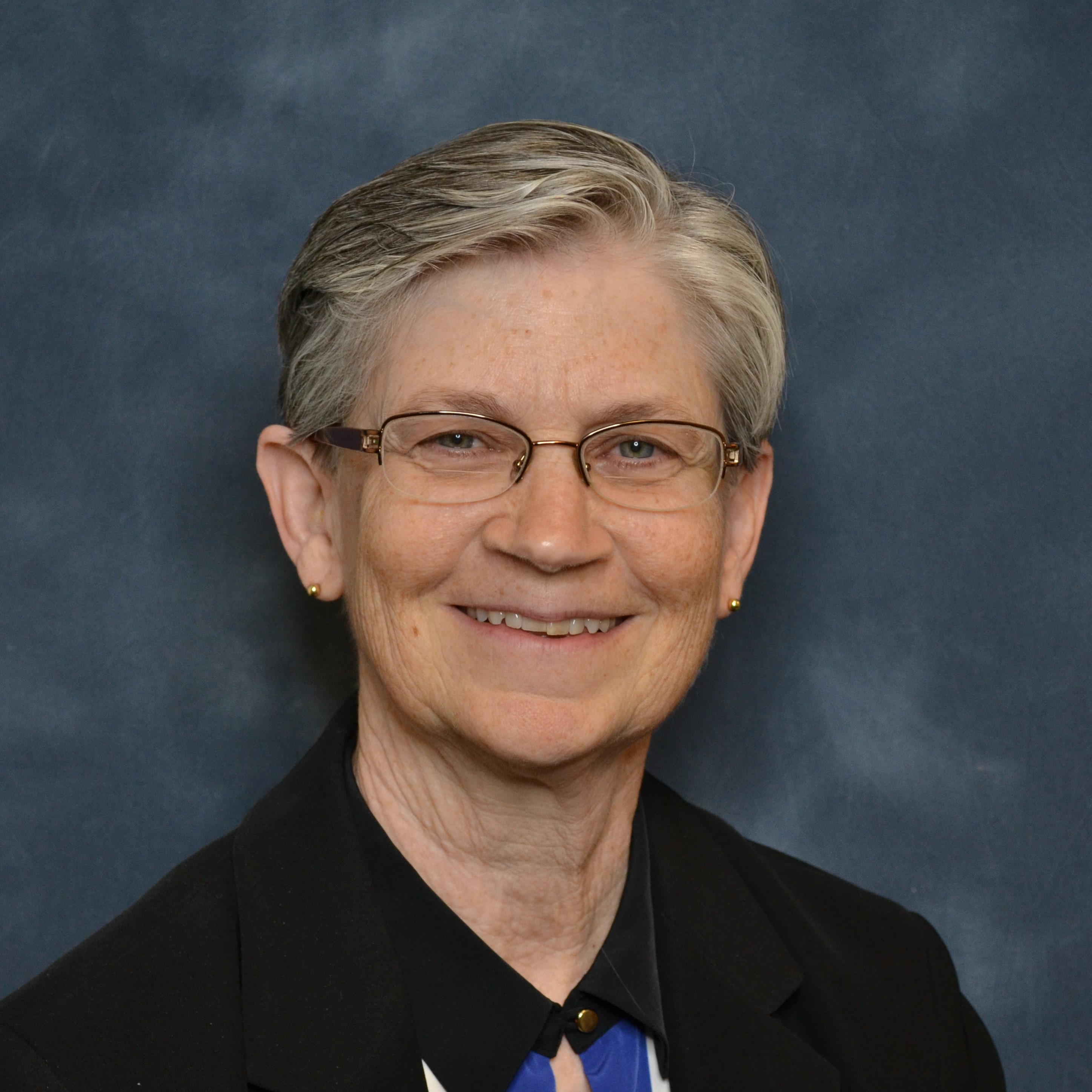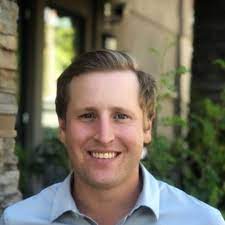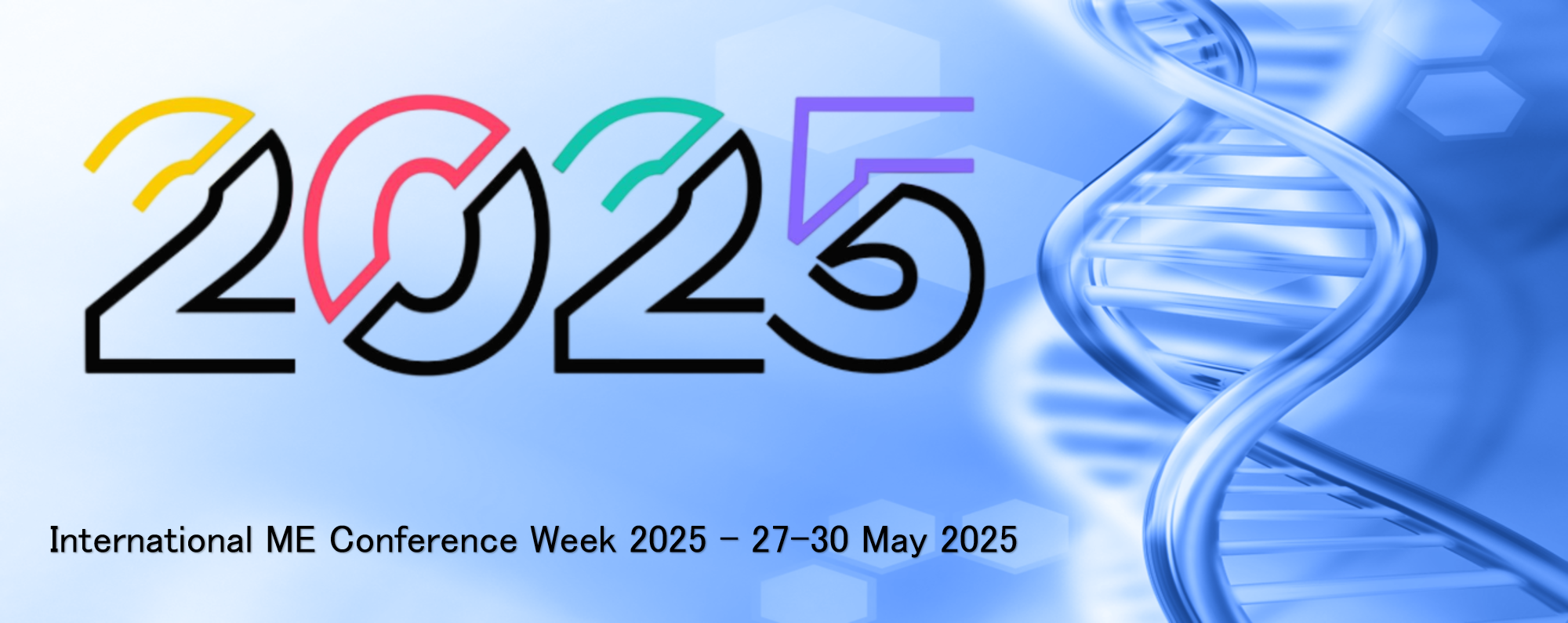Post-Conference Week 2024
Notes from Our International ME Conference Week 2024
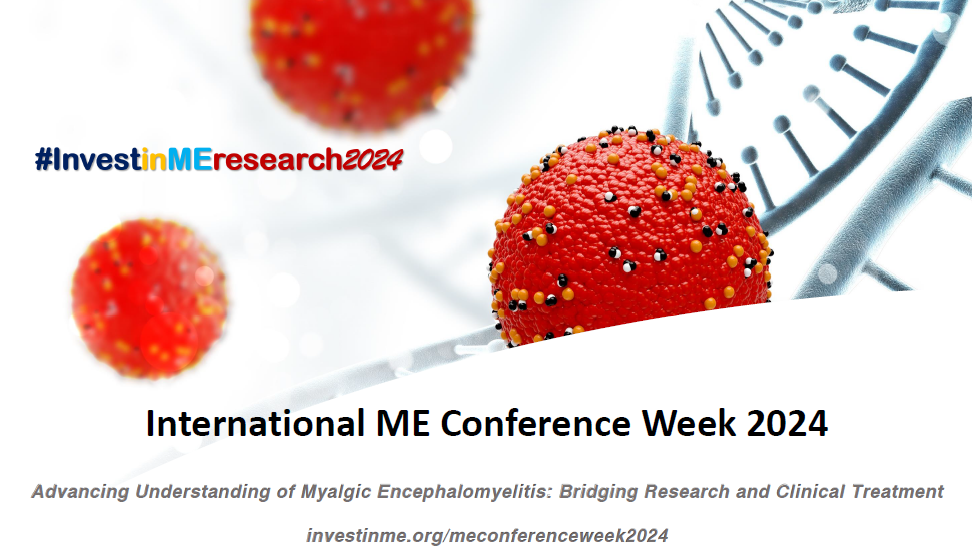
For 2024 we decided to stay at the same venue as used in 2023 as it seemed the best place to encourage collaboration and
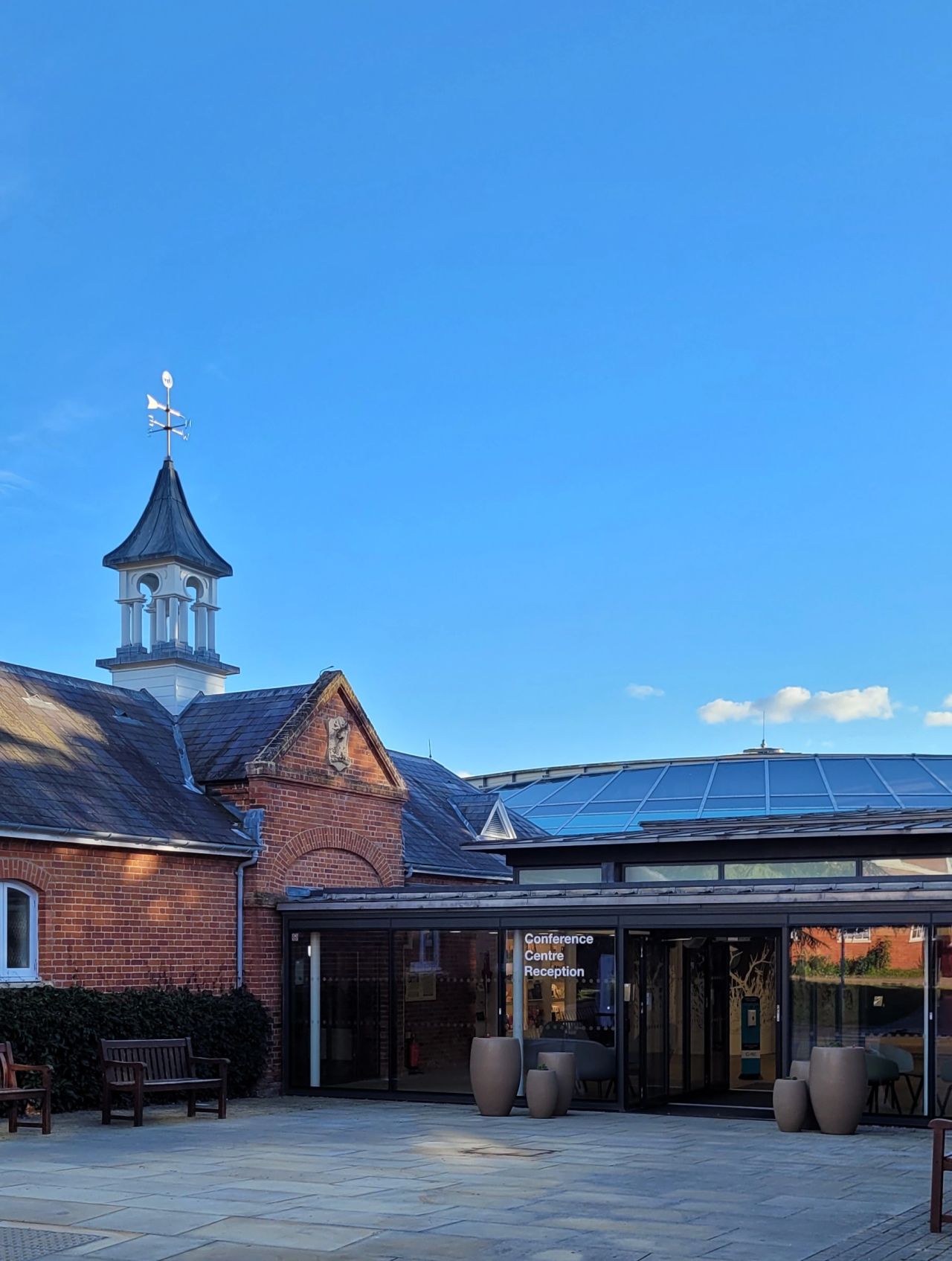 sharing of knowledge - later confirmed as a sound approach as the positive comments came back
from researchers regarding the success of
the events.
sharing of knowledge - later confirmed as a sound approach as the positive comments came back
from researchers regarding the success of
the events.
Resources for the charity are always limited. Despite doing all of the planning
and arranging and hosting ourselves,
the charity still has to
encourage participation and collaboration amongst researchers, covering or subsidising attendance costs in many cases.
The charity is also committed to developing and supporting European research collaboration via
the European ME Research Group and Young EMERG and this continued support
requires commitment
to this strategy - especially as we try to attract new researchers and researchers from other disciplines to participate.
So special mention should be made of
IMET - the Irish ME Trust - who again
helped with a donation towards the cost of the conference.
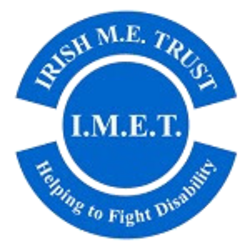 IMET has sponsored every conference that IiMER has arranged since the charity started these events in 2006
and they have been wonderful colleagues - initiating with us and others the European ME Alliance (EMEA),
which is now representing eighteen countries.
IMET has sponsored every conference that IiMER has arranged since the charity started these events in 2006
and they have been wonderful colleagues - initiating with us and others the European ME Alliance (EMEA),
which is now representing eighteen countries.
IMET also have a stake in the RESTORE_ME clinical trial due to their previous donation to our
biomedical research fund.
Conference Week
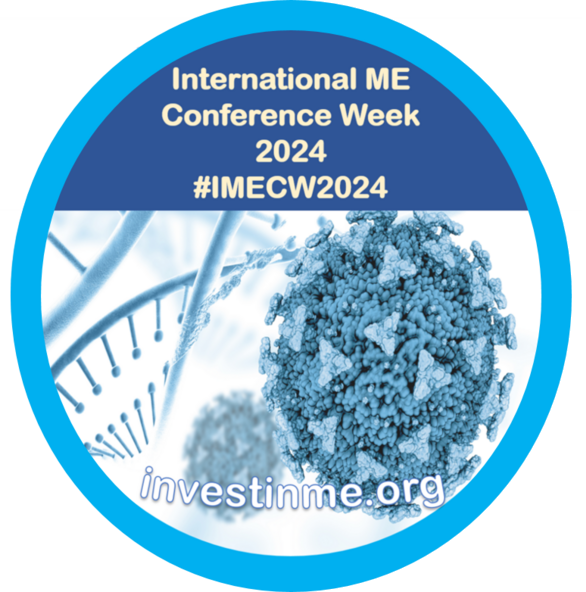
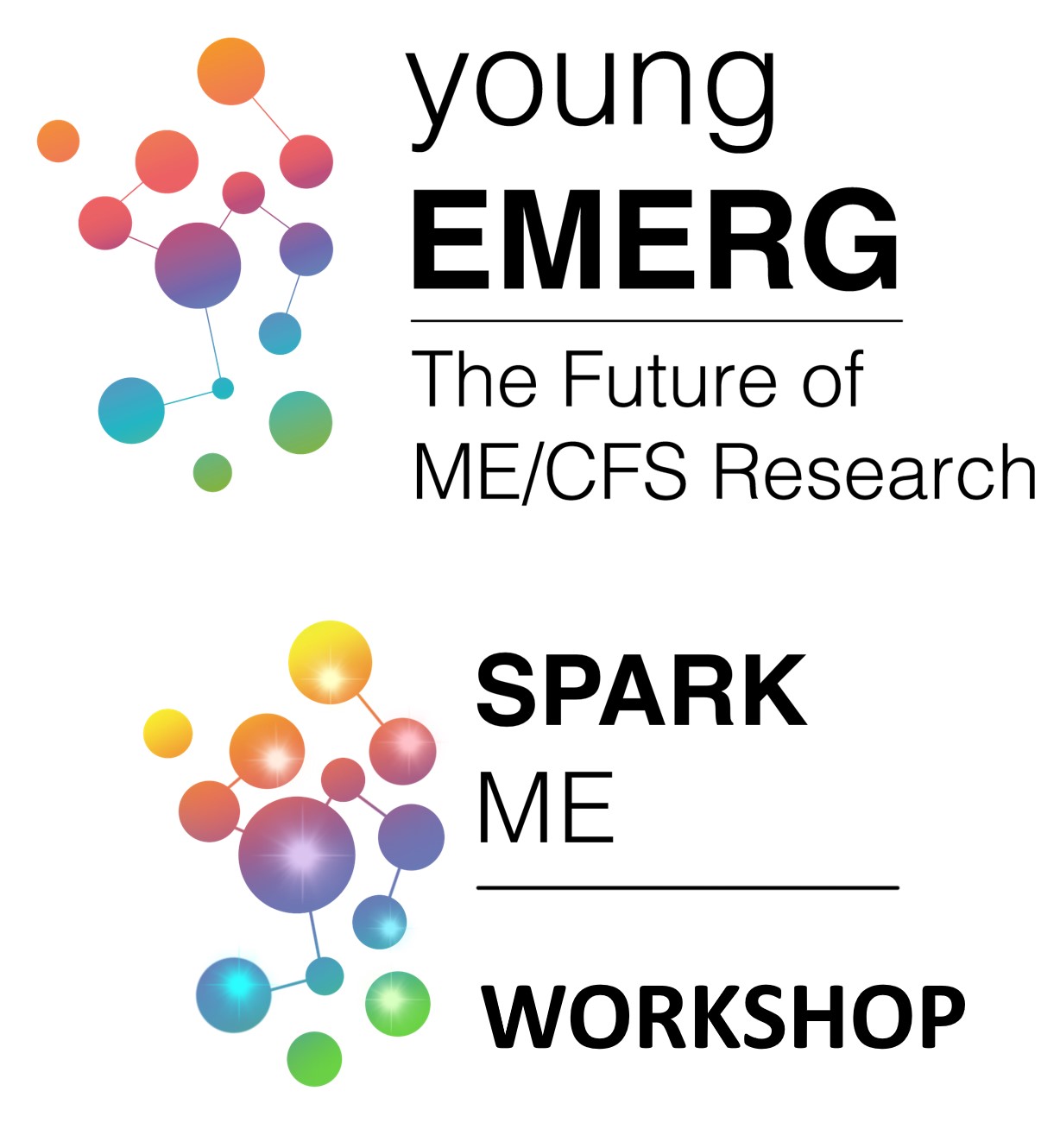
The core events of the conference week included continuing to support the Young EMERG group that
we formed in 2023 and
supporting the week long participation of the Young EMERG committee with this annual workshop
for young and early career
researchers. We provided free registration for ECRs from USA, Europe and Australia to facilitate participation.
We arranged the 2 day researchers’ colloquium – the thirteenth now organised – bringing together researchers from 18 countries
and our clinicians'/public conference followed and attempted to focus more on the work of clinicians and the role of AI and precision
medicine in developing
knowledge and treatments.
All of this was accompanied by post-event dinners bringing researchers and clinicians and patient groups
together where more discussions
could take place.
Both colloquium and conference were fully CPD-accredited by the Royal Colleges.
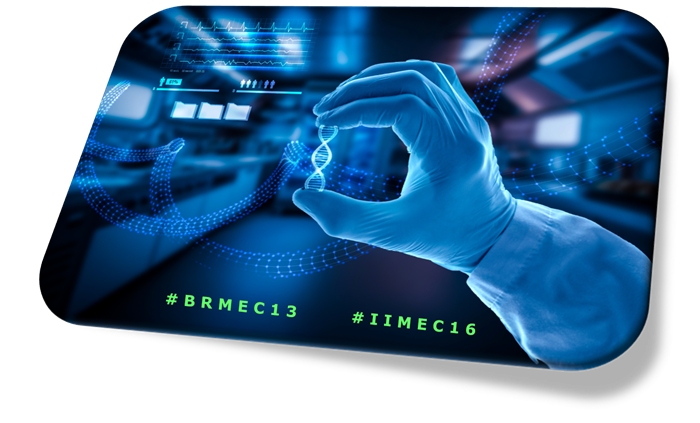
Prior to the planned events we also attempted to organise another meeting.
Addressing the DHSC Delivery Plan Failure
We commented previously on the frustration of sitting
 in the DHSC Delivery Plan research working group
where none of our proposals were considered and, after two years of unambitious meetings and a total
lack of direction and leadership ,
nothing of relevance having been produced
[
https://www.investinme.org/ukcrc-epilogue.shtml
].
in the DHSC Delivery Plan research working group
where none of our proposals were considered and, after two years of unambitious meetings and a total
lack of direction and leadership ,
nothing of relevance having been produced
[
https://www.investinme.org/ukcrc-epilogue.shtml
].
So, prior to the conference week we had attempted to initiate something different, by proposing that
we would arrange (and pay for and host) a meeting between researchers in the DHSC/UKCRC research working group
and NIHR and MRC on the
first day of the
International ME Conference Week, on 25th May, to discuss funding and research into ME.
The charity would organise everything –
and for those who could not attend in person then we would facilitate a virtual connection.
On that day we had also arranged the Young EMERG/SPARK ME Early Career Researcher workshop – so all could
see the talent that the charity and the European ME Research Group (EMERG) has been cultivating for some years.
The Invest in ME Research Conference Week would also have representatives from institutes around the world and
leading figures from NIH and CDC, and the EMERG group of European researchers would also be meeting
later that day to plan new funding applications and collaboration
 [we even proposed that researchers in the DHSC research working group could take the opportunity of joining EMERG and
attend this meeting also].
[we even proposed that researchers in the DHSC research working group could take the opportunity of joining EMERG and
attend this meeting also].
Our idea was to synergise these opportunities into a Europe-wide strategy, with multiple possibilities for cross-site
collaboration.
What better approach to making a rapid progress on a research strategy for ME
in the UK - an initiative that could redress some of the debacle
that was the DHSC Interim Delivery Plan project?
We received a positive reaction from researchers whom we contacted - and awaited a response from MRC and NIHR.
And waited........
The charity strives to do as much as it can with the resources we have but eventually, after hearing
 nothing from MRC or NIHR, the charity had to commit and confirm its reservations and
arrangements
with
the conference centre and
we had to let our preliminary room and catering reservation lapse.
nothing from MRC or NIHR, the charity had to commit and confirm its reservations and
arrangements
with
the conference centre and
we had to let our preliminary room and catering reservation lapse.
There was little point in the charity
committing precious charity funds for a meeting at which the principal protagonists showed no interest in attending.
That same uncertainty and apathy has
characterised government and MRC attitudes to ME for the thirteen years where the MRC has had a highlight notice for
research into ME - a highlight notice that was neither monitored nor for which any status check or organised checkpoint
meetings were performed to
ascertain if or why there was little interest shown, or why no allocation of funds had been committed to ME in that time.
We never did hear back from MRC or NIHR - and another opportunity presented by the charity was lost.
Young EMERG SPARK ME Workshop
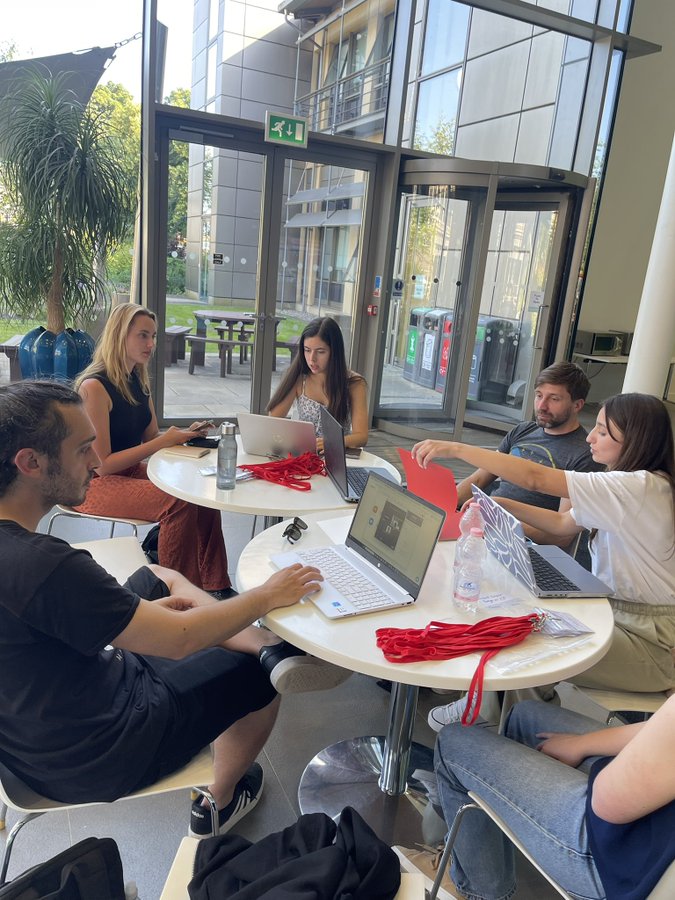
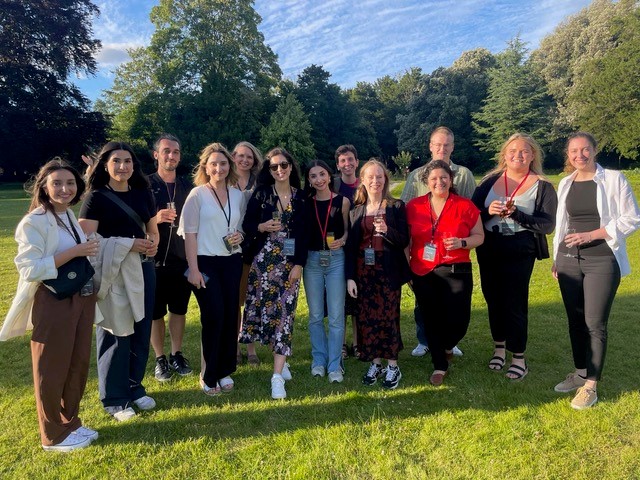
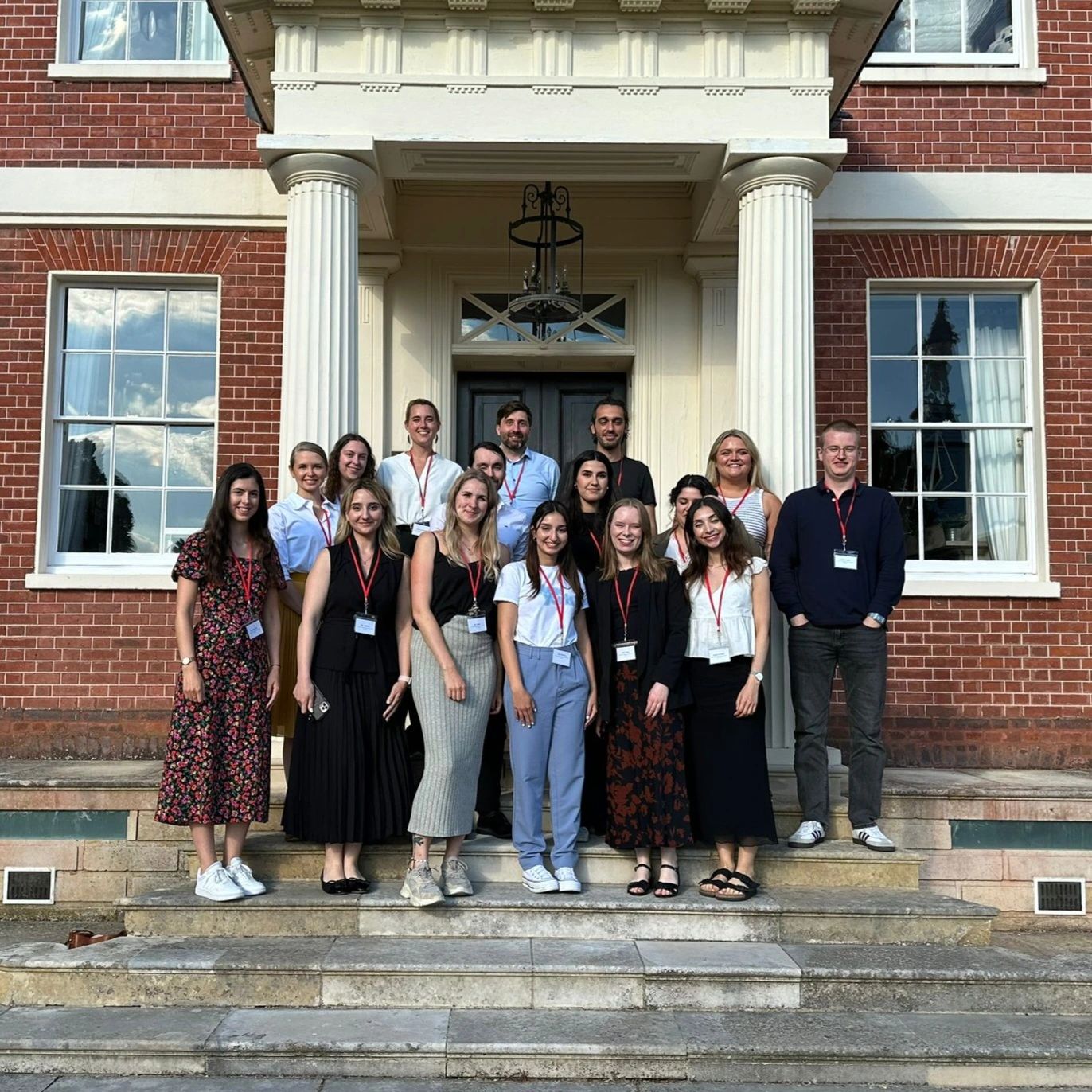
This year we arranged for the Young EMERG workshop to begin conference week and allow a start to be made on getting the future ME researchers together before the other events started.
We were pleased to see the agenda again attracting participation from the European Research Council (ERC) as well as NIH and other leading researchers.
The workshop also allowed for remote speakers and attendees as the time zone difference and costs prevented some from being present. It was also interesting that the workshop attracted interest from others and more than one of the supervisors who were present for the BRMEC13 colloquium had wanted to come and sit and listen to their post-doc/PhD students when they presented.
The event built on the experience of the previous year's Young EMERG workshop and also on the NIH Washington event that was held last December (https://www.investinme.org/IIMER-Newslet-231201-sparks.shtml).
For the BRMEC13 Colloquium that followed the YE workshop it was good to see some of the Young EMERG group giving presentations.
Young EMERG has the potential to grow from strength to strength and secure a sound foundation for future research into ME in Europe with collaboration formed between young researchers from many European countries - and with relationships built to the USA contacts who participated.
EMERG/NIH Workshop
It had been planned to hold a planning meeting for the European ME Research Group (EMERG) - with new members attending.
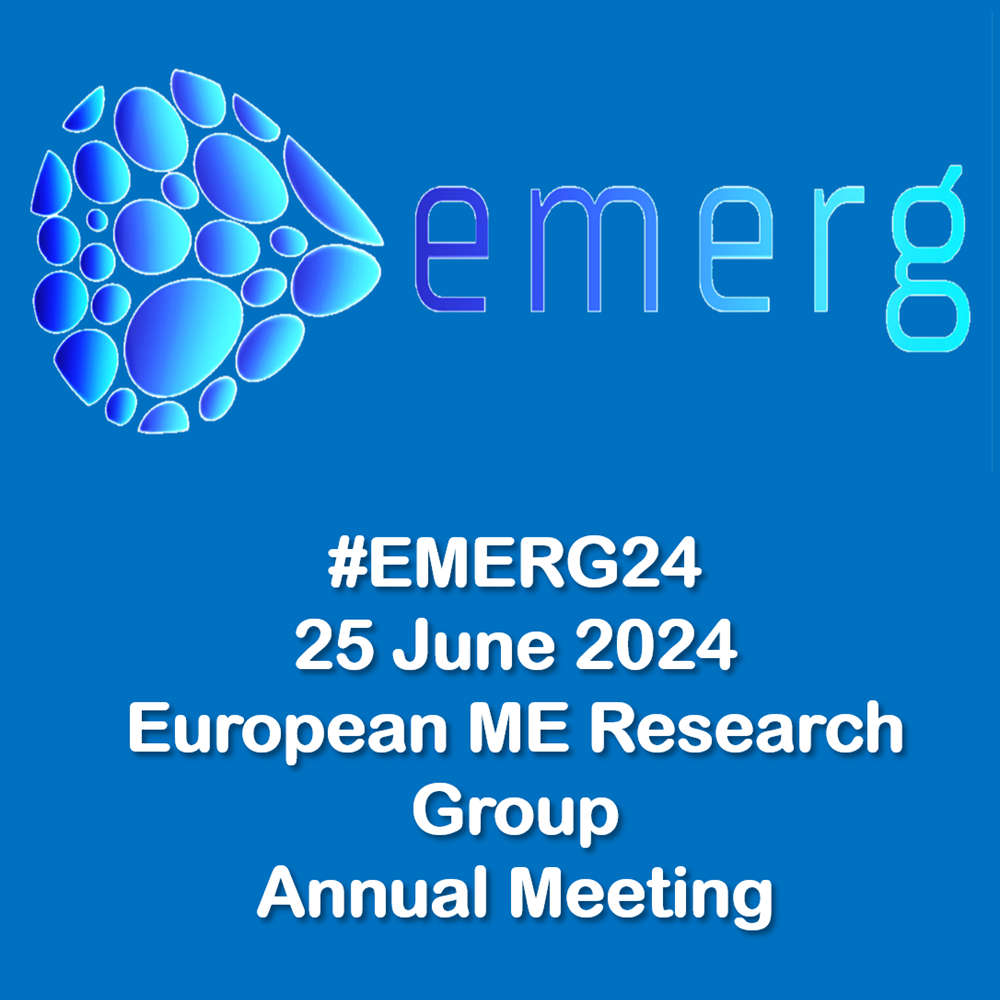 This was put on hold pending the decision on hosting a meeting with MRC and NIHR.
Once it was clear that our offer to host this meeting had been effectively ignored
then we proceeded with our planned EMERG planning meeting.
This was put on hold pending the decision on hosting a meeting with MRC and NIHR.
Once it was clear that our offer to host this meeting had been effectively ignored
then we proceeded with our planned EMERG planning meeting.
However, following the publication of the NIH Roadmap for ME it was decided instead to use the event to bring USA and European
researchers together to discuss clinical trials and the creation of an international working group to standardise on
trial design.
A brief preparatory meeting had been arranged earlier and the EMERG-NIH workshop proceeded following
the Young EMERG workshop.
Dr Vicky Whittemore from NIH chaired the meeting that included in person and remote delegates from USA.
We hope to have more news of this group soon.
BRMEC13 Colloquium
The two day BRMEC13 Colloquium took place on 26-27 June.
Over the years of arranging the colloquiums we have tried to build up a family of researchers who come together,
augmented by specific expertise
or new researchers
who are introduced to widen the research envelope,
bring in new ideas and encourage utilisation of other research trends and resources.
We extended invitations to attend our events to over 160 researchers around the world
and researchers and clinicians from four continents participated.
Working with the European ME Research Group the overarching theme of the colloquium
was
"Acknowledging the acceptance by both clinicians and researchers of
'THE INFECTIOUS AETIOLOGY’ of ME/CFS" and
focused on uncovering the complexities of ME,
exploring acute infection, chronic infection, and co-infection.
These sessions covered various aspects of ME research, facilitating in-depth discussions on Chronic Infection,
Nervous System and Neuroinflammation,
Immune System, Metabolism, Epigenomes and Transcriptomes, Physiology, and Other Non-Infectious Trauma.
For the various sessions we had moderators from EMERG.
![]()
This year's events included a focus on the critical roles of Systems Biology, Artificial Intelligence (AI), and Precision Medicine in advancing ME research - fields becoming increasingly important for research and the phenotyping of patient cohorts and essential for enhancing our understanding and treatment of ME, offering innovative and effective approaches for unravelling the complex biological networks involved in ME, transforming patient cohort research and enabling more precise and personalised medical approaches. Tamas Korcsmaros from Imperial College London presented a systems biology approach to ME utilising AI. With 15 years of expertise in studying signalling networks and autophagy, his work focused on cell-cell and cell-microbe interactions affecting intestinal health. His research aims to harness precision medicine to address challenges in treating inflammatory bowel disease. At the colloquium, Dr Korcsmaros shared his insights on using computational and experimental systems, including organoids, to improve understanding of ME pathomechanisms.
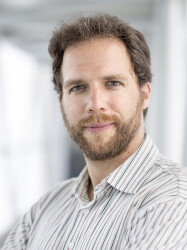
![]()
Several of the presentations related to research on long covid and new researchers spoke at the event -
https://www.investinme.org/brmec13-news-0501.shtml
and
https://www.investinme.org/brmec13-news-0302.shtml
David Price summarised collaborative efforts to inform the underlying mechanisms of disease,
focusing on comprehensive immunologic, microbiologic, and proteomic analyses of
coagulopathy, complement dysregulation, and discrete patterns of inflammation, which could feasibly inform
the diagnosis and treatment of long COVID.
Thomas Vogl recently received EU funding as part of a consortium for
a project on how infectious diseases (IDs) together with environmental and genetic factors trigger the
onset of non communicable diseases (NCDs)
Avindra Nath from NIH presented data from the recent NIH Intramural study.
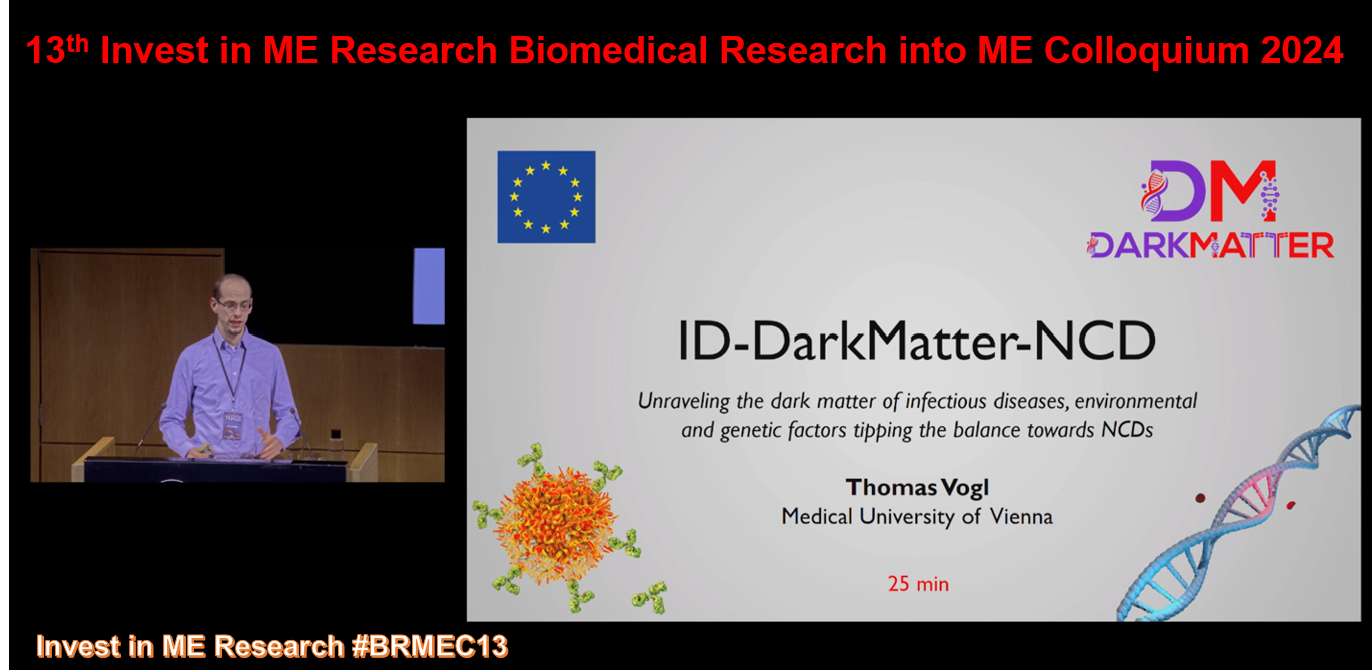
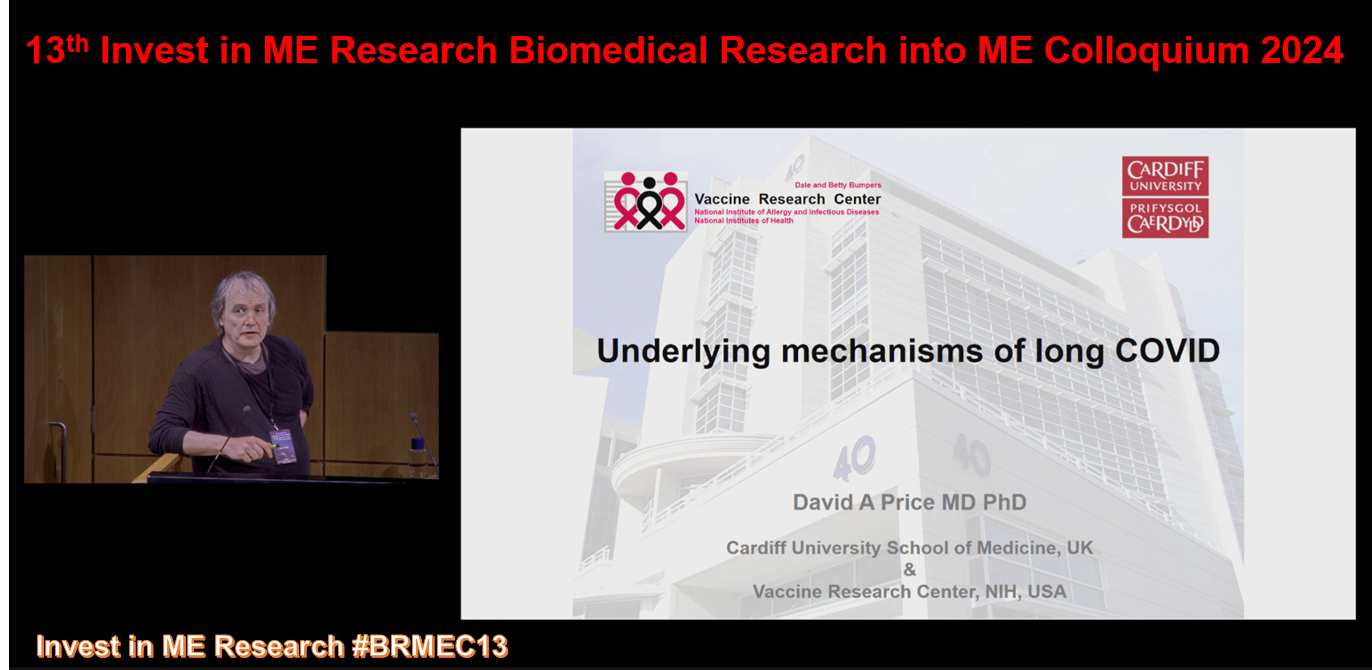
![]()
In the Physiology session our great friend Professor Jonas Bergquist of EMERG moderated the session. In true Jonas-style he not only moderated the session but gave us a short, unscripted and entertaining factod demonstrating our progress in science.
David Systrom presented Insights from Invasive Cardiovascular Exercise research and Branislav Milovanović gave a presentation on Acute and chronic infections in patients with post – infection syndromes and showed certain autonomic dysfunction in patients with post-infection syndrome, as well as certain differences between different post-infection syndromes.
Lutz Schomburg discussed the diagnostic and potential relevance of
autoantibodies for fatigue symptoms.
Markku Partinen presented on Dysautonomia and Long Covid
and showed results from
International Covid Sleep Study Consortium, where altogether 16 countries have participated,
and that indicated
an increase of ME/CFS during the pandemic.
It remains to be seen if the prognosis of ME/CFS related to COVID-19 has a better or
worse prognosis than ME/CFS that is unrelated to COVID-19. The triggers of ME/CFS must be
studied in more detail. In many cases dysautonomia seems to be related to an immunological process,
for example inflammation of the autonomic nervous system ganglia.
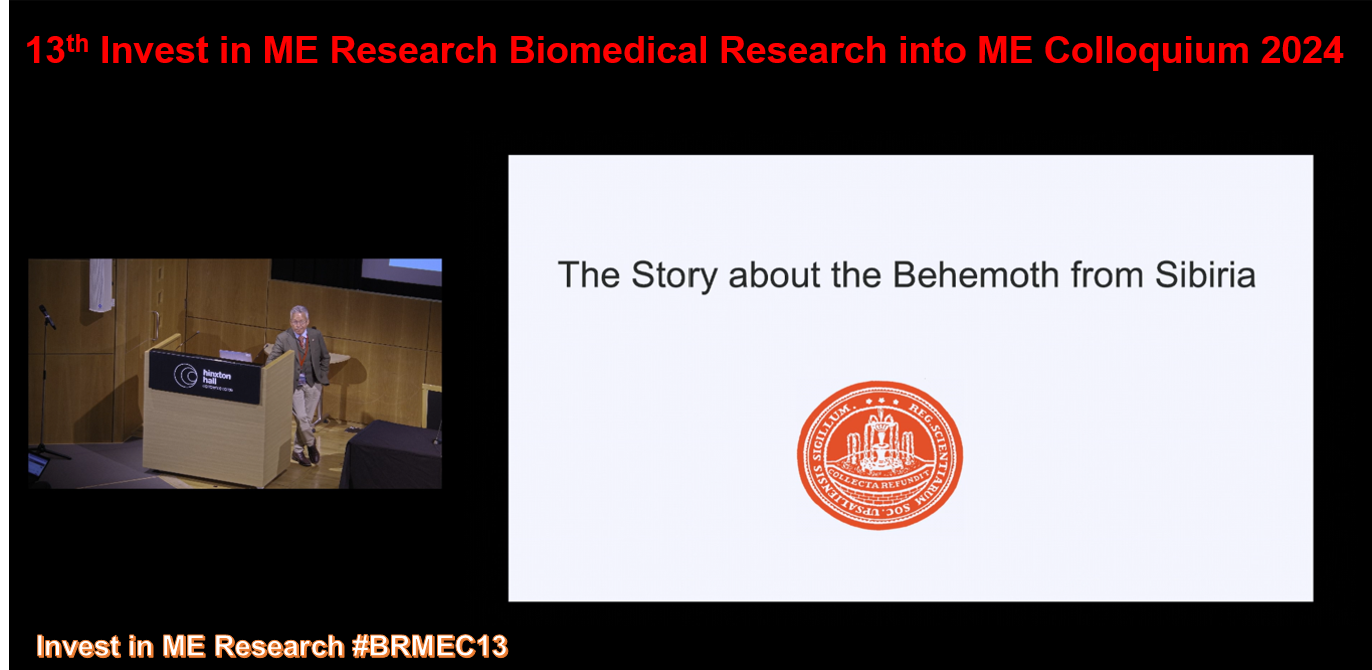
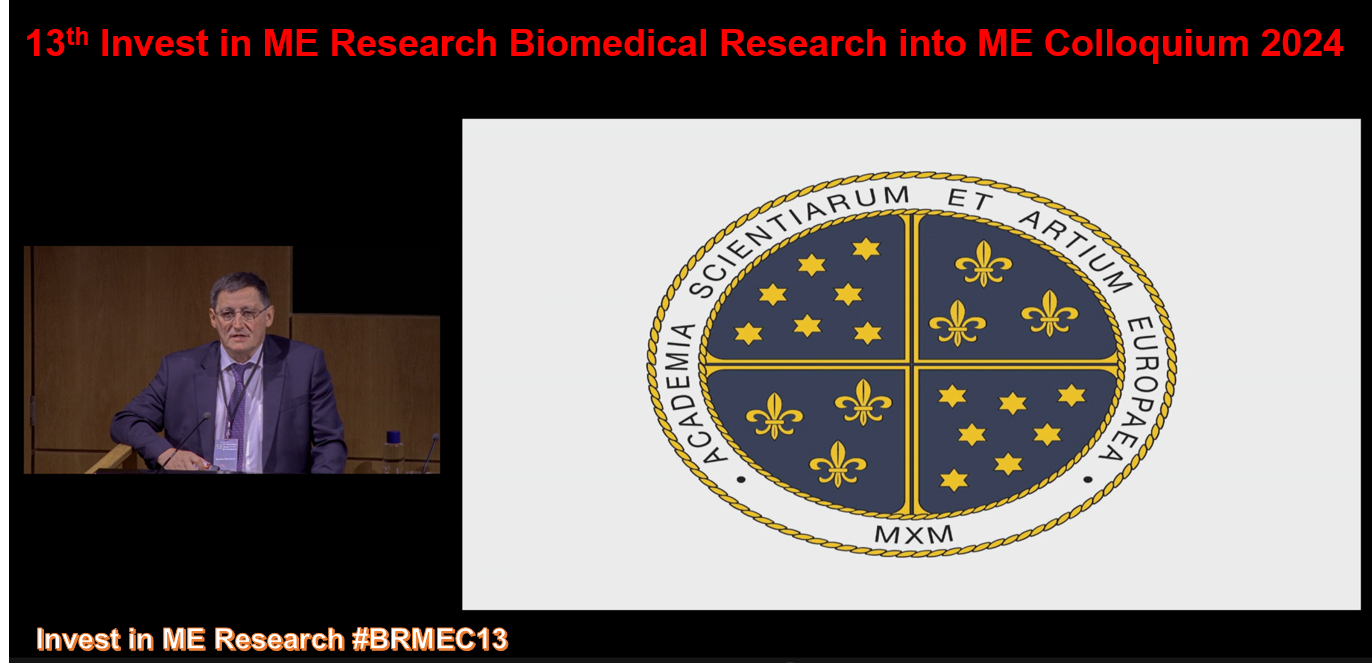
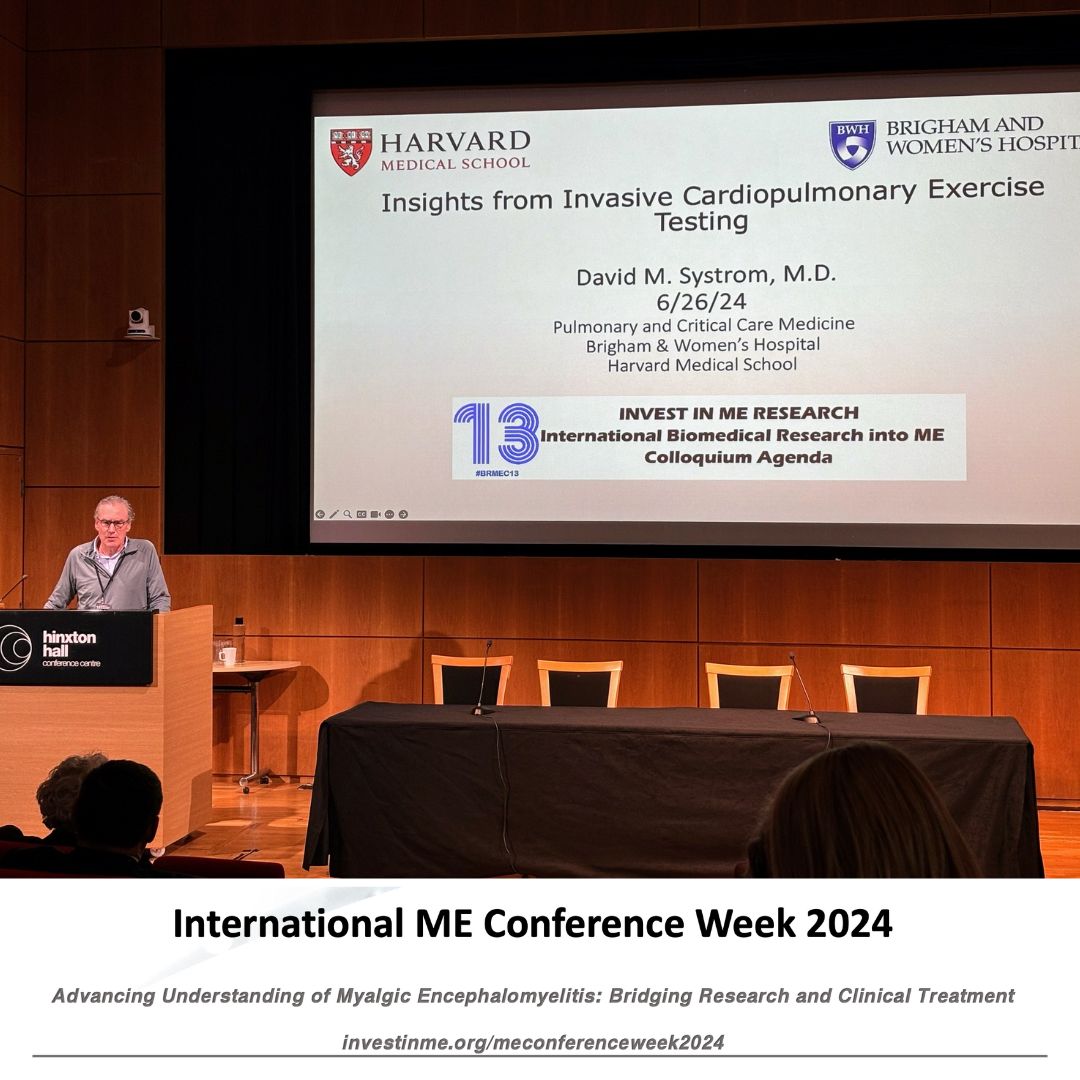
![]()
The Nervous System and Neuroinflammation session had presenters Mike VanElzakker [Using fMRI and PET imaging to study neuroinflammation in ME], Michelle James [ Innate immune activation in the whole body and CNS of ME patients using PET/MRI] and Avi Nath [Omics and Sex differences in ME/CFS] - and was moderated by Jon Brooks from University of East Anglia.
For the Metabolism Body and Cell session - moderated by Rikke Olsen, from Aarhus University in Denmark,
we invited Yilin Kang from the renowned Suomalainen-Wartiovaara Group at University of Helsinki
to present on their mitochondrial expertise
where, from a population databank of ~300,000 Finns they demonstrated enrichment of immunodeficient traits
in p.W748S carriers.
Their evidence suggests that POLG1 defects compromise antiviral tolerance,
triggering epilepsy and liver disease.
The finding has important implications to mitochondrial disease spectrum.
Rob Wust from Virje University, Amsterdam, Netherlands presented on his recent groundbreaking research that showed that alterations in skeletal muscle structure was associated with a lower exercise capacity in both patients populations, but that other factors contribute to the rapid development of post-exertional malaise in long COVID and ME/CFS.
Kristoffer Hansen presented on
Genetic predisposition to mitochondrial metabolic disturbances in individuals suffering from severe long COVID.
This study provided initial evidence of a potential genetic basis for a predisposition to mitochondrial dysfunction
in long COVID, demonstrating compromised cellular energy capacity in these patients.
The findings may pave the way for targeted therapeutic strategies aimed at
mitigating mitochondrial dysfunction.
![]()
Professor Eva Untersmayr-Elsenhuber from the Medical University of Vienna
chaired the Immune System Primary and Secondary session beginning with Adrian Liston from Cambridge University
who
discussed
the ability of immune-modulating biologics to prevent and reverse pathology that has transformed recent
clinical practice with
the recent identification and characterization of a small population of regulatory T (Treg)
cells resident in the brain presenting one such potential therapeutic target.
Professor Simon Carding presented
progress to date in characterising the virome and identification of microbes and microbial products
recognised by the immune system in ME patients.
Professor Maureen Hanson from Cornell University
presented on Plasma Proteomics in Response to Exercise.
Johanna Rohrhofer from the Medical University of Vienna gave a presentation
on stratifying ME/CFS patients that identified distinct pathophysiological characteristics and allowed
the identification of two subgroups.
This differentiation highlighted the importance of precise patient stratification in ME/CFS research,
particularly for developing effective treatment strategies.
Professor Nancy Klimas presented
on the Role of Endothelial Dysfunction in ME and Long COVID
and the BBB disruption's role in these conditions,
and proposed potential therapies to study in the repair of the endothelium.
![]()
Professor Elisa Oltra moderated the Epigenomes and Transcriptomes session
that included presentations from Professor Alain Moreau and Professor Andrew Grimson presenting
on
single-cell transcriptomics of the immune system in ME/CFS,
presenting on human endogenous retrovirus expression in the immune system of ME/CFS.
![]()
Having hosted an EMERG-NIH workshop on clinical trials on the first day the colloquium contained a follow-on session on Clinical Trials with Dr Jesper Mehlsen presenting.
Dr Beth Unger from CDC followed and presented on phenotyping using the Multi-site Clinical Assessment of Myalgic Encephalomyelitis/Chronic Fatigue Syndrome (MCAM) study that enrolled participants (January 2012 – July 2020) from 7 speciality clinics led by clinicians experienced in diagnosing and caring for patients with ME/CFS.
Leonard Jason presented his work on a longitudinal study
of ME patients.
Wenzhong Xiao presented his work
on Identifying potential candidates for clinical trials using AI network medicine
Dr. Gunnar Gottschalk also presented news from Simmaron's Clinical Trial of Rapamycin.
Many other presentations and group discussions took place and continued into the evenings.
The colloquium was judged to have been a success and a worthwhile contribution to research into ME.
“I want to congratulate and thank you for the successful meeting . The scientific program was excellent, and the friendly atmosphere altogether made this conference a success. Thank you for including me.“
IIMEC16 conference - clinicians' day
We were delighted that the WHO provided a video in support of the conference
Our thanks to WHO Europe for being partners in supporting International ME Conference Week by providing this video from Dr Cathal Morgan,
at the WHO Regional Office for Europe, for delegates to the Young EMERG Early-career researcher workshop, the 13th Biomedical
Research into ME Colloquium #BRMEC13, and the 16th International ME Conference #IIMEC16 and to participants at the European ME
Research Group-NIH workshop that will be taking place during the week.
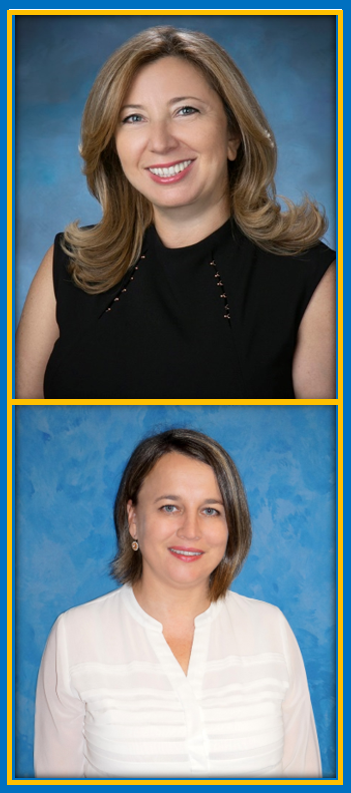
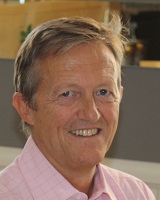

For the IIMEC16 conference we considered how best we could make the event useful for clinicians and patients, providing opportunities to discuss and interact, and provide more useful information – not just on what is happening in research but also what might be useful for clinicians and patients to know.
One of the ideas was to juxtapose the approaches taken by clinicians in treating people with ME. And why not look at approaches taken in USA and in Europe?
From USA we welcomed Dr Irina R Rozenfeld and Dr Violetta Renesca
From Institute for Neuro-Immune Medicine, Department of Clinical Immunology, Dr. Kiran C. Patel College of Osteopathic Medicine,
Nova Southeastern University, USA.
Both doctors attended the #BRMEC12 colloquium last year and have been treating people with ME for some
time and with much success.
From Europe Dr Jesper Mehlsen discussed his approach.
His clinic in Copenhagen, Denmark, has thousands of patients – even more so now with the closure of the clinic
in Stockholm recently.
Dr Mehlsen’s main research areas are methods for the study of autonomic cardiovascular control; Mathematical modelling of
cardiovascular control; Autoimmune response to vaccination; Mathematical modeling of the neuroinflammatory reflex.
He has been developing a European consensus on a treatment protocol for ME/CFS.
In the panel session that followed we also invited Dr Peter La Cour to discuss his findings from his recent paper on severe ME patients - https://www.tandfonline.com/doi/full/10.1080/27707571.2024.2359958
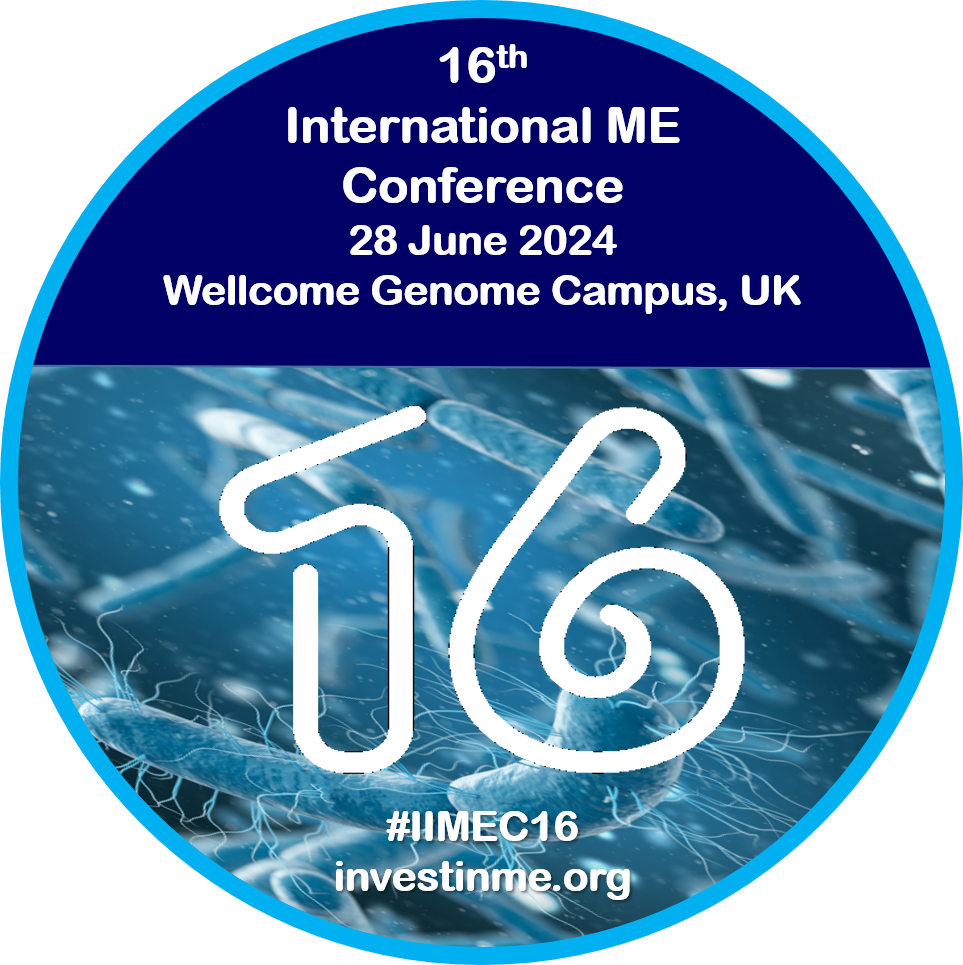 Videos of the presentations from #IIMEC16 have been made available on the Invest in ME Research web site
Videos of the presentations from #IIMEC16 have been made available on the Invest in ME Research web site
click here
“ A belated THANK YOU for having arranged a very successful meeting (once again). It is really nice to meet with "the family" and I think that the quality of the presentation was even better than before. Great to have started the transatlantic collaboration “
JOURNAL of IiMER
For this conference week we once again produced a Journal of IiMER.
This edition contained the key messages and foreword from the recent
European ME Alliance Pan-European ME Patient Survey.
This was important for researchers at the colloquium to see and all delegates to all events were provided with a copy.
We also included a little of what the charity has achieved
thanks to the support of some wonderful people who seek no celebrity status and rarely get recognised for their efforts.
Thank you.
Hard copies of the Journal are available from the charity
“ Thank you for such a wonderful meeting this year. It seems to get better and better. “
Our Thanks
From Invest in ME Research our overwhelming thanks to our supporters – without whom nothing would happen
Our thanks to all of the Young EMERG and #BRMEC13 Colloquium delegates from around the world coming together
in a friendly atmosphere of 3 days/4 evenings of collaborative and productive discussions.
The charity was also able again to facilitate a number of interactions between patients and clinicians and researchers.
Thanks to delegates at 16th International ME Conference - #IIMEC16 - for supporting the event by attending. We have, for some years, balanced the priorities of bringing international researchers together to discuss ideas and collaborate with the possibility of also allowing the public to listen to the research being performed. Without support for the public conference from attendees there would be no point in holding this event.
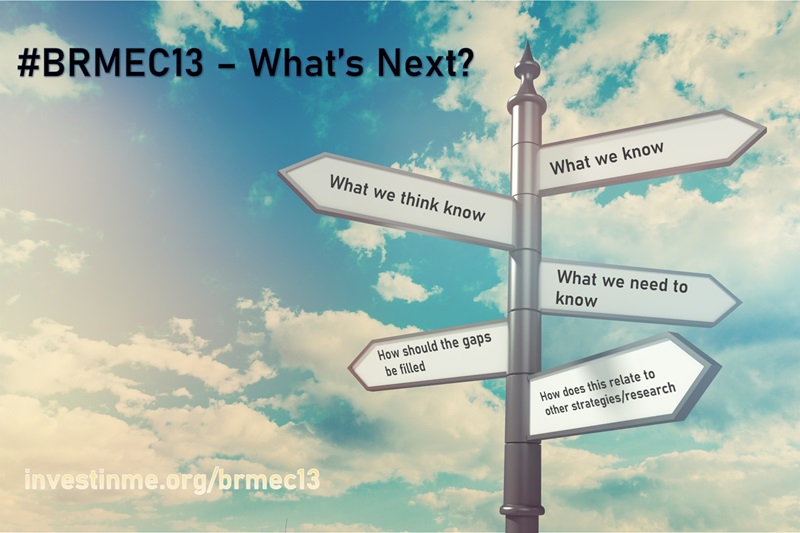

“ I would like to thank you for giving me the opportunity to come to the conference and for making me feel so welcome. Thank you very much for your hospitality and thank you very much for organizing this conference. Our experiences of how you are treated by those who are supposed to help are unfortunately largely bad. After attending your conference this year I was filled with hope. The conference was filled with hope. I think it is important that you hear how important this conference is for everyone concerned. Just to have a place where you can meet doctors, scientist and others with ME and their families I feel is very important. We feel so isolated and alone most of the year, so having the opportunity to meet others who understand is priceless.
If your conference can reach out to the world and the scientists can make a breakthrough in their research, it will mean everything to families all over the world. We will be believed and heard and children with ME and their families will be protected from further abuse from the child welfare services, for example. “
What’s Next?
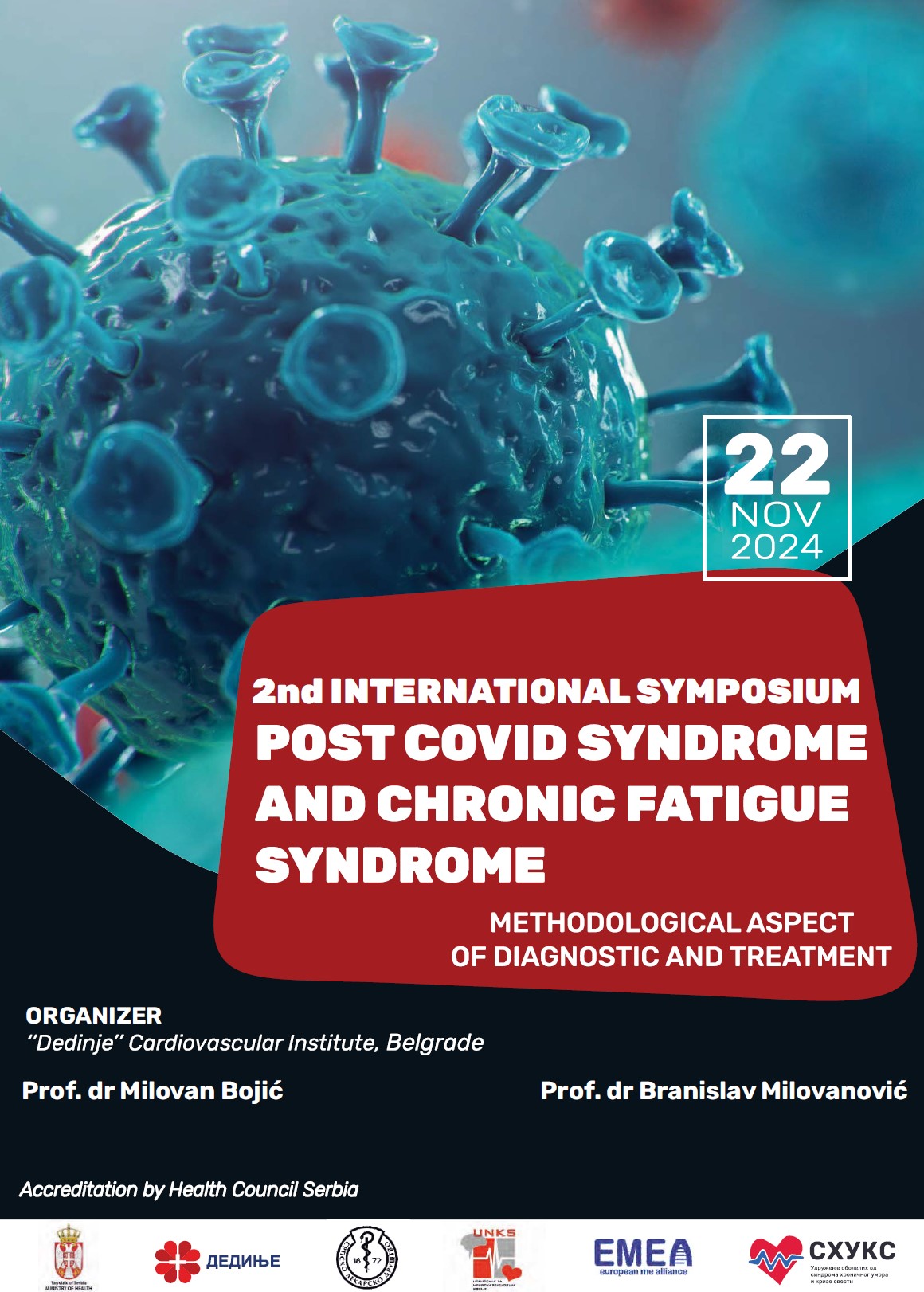 We now look forward to the next conference which is being set up by
Dr Branislav Milovanovic in Serbia and to which many EMERG researchers
have been invited.
We now look forward to the next conference which is being set up by
Dr Branislav Milovanovic in Serbia and to which many EMERG researchers
have been invited.

And 2025
Following the success of the events we decided to announce early our plans for 2025 in order
to give more time for preparation and, hopefully, to introduce more researchers whom we can invite to our
research colloquium.
So, 27 - 30 May 2025 are the dates for International ME Conference Week next year.


